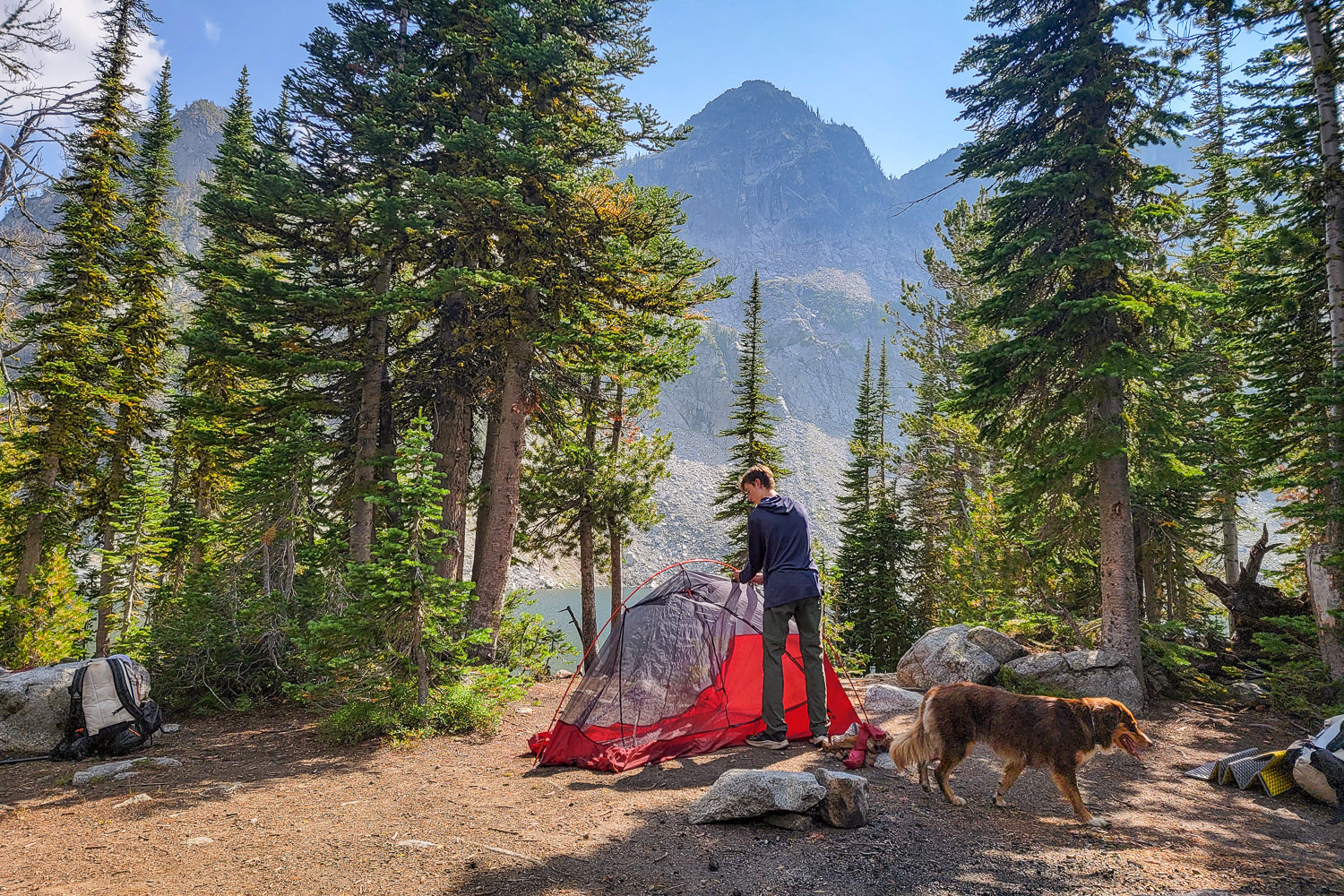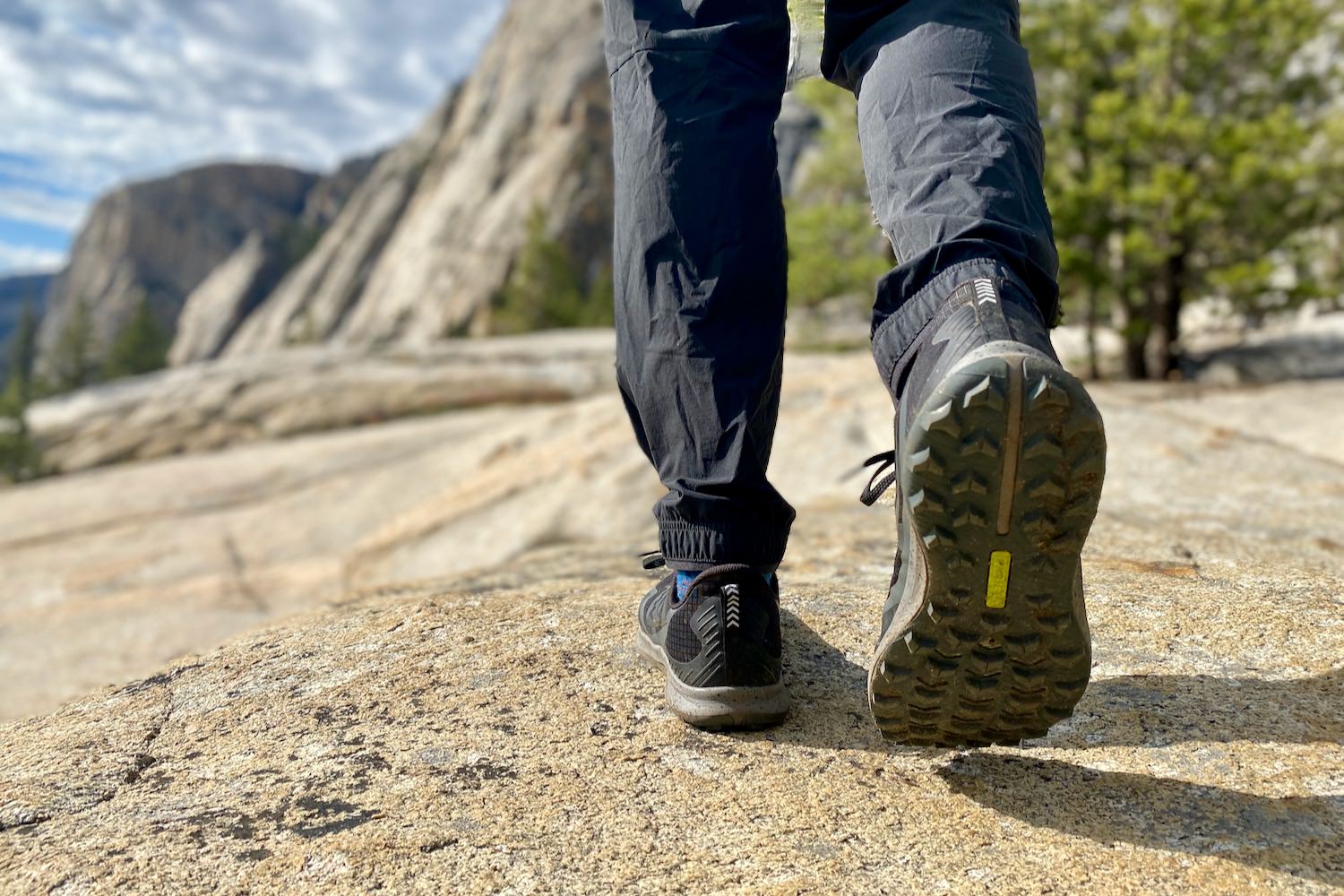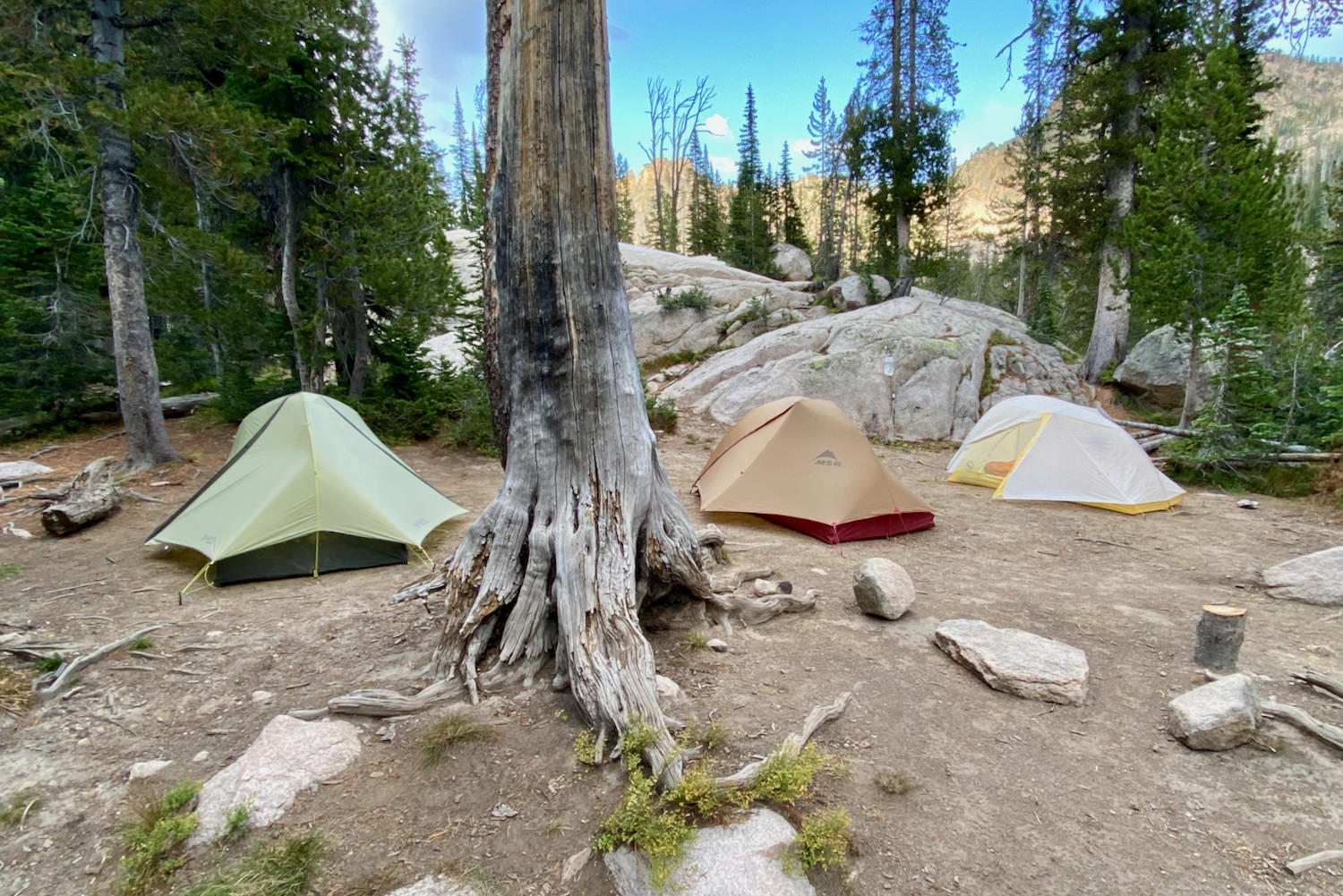
In case you’re on the lookout for a light-weight backpacking shelter that blends consolation, user-friendly design, and glorious climate safety, a semi-freestanding tent is the perfect alternative.
Semi-freestanding tents provide decrease weight with out sacrificing the consolation and ease of double-wall tents – a mixture that has made them extra standard than ever lately. Due to a easy pole construction, semi-freestanding tents are quick and straightforward to pitch. They provide inside conveniences like sensible pockets and additional headroom, options which can be typically lacking in single-wall, non-freestanding options like trekking pole tents.
Within the semi-freestanding class, three tents steal the highlight: the Huge Agnes Tiger Wall UL 2, NEMO Hornet OSMO 2, and MSR FreeLite 2. These shelters are on the high of their class and excel in each essential manner for backcountry adventures. They’re extraordinarily mild, extremely purposeful, and easy to make use of. That’s why every of those tents ranks on our listing of the Finest Backpacking Tents.
After totally testing every tent in assorted backcountry circumstances, we assembled this information to match their strengths and weaknesses. Learn on to search out out which tent got here out on high and why.
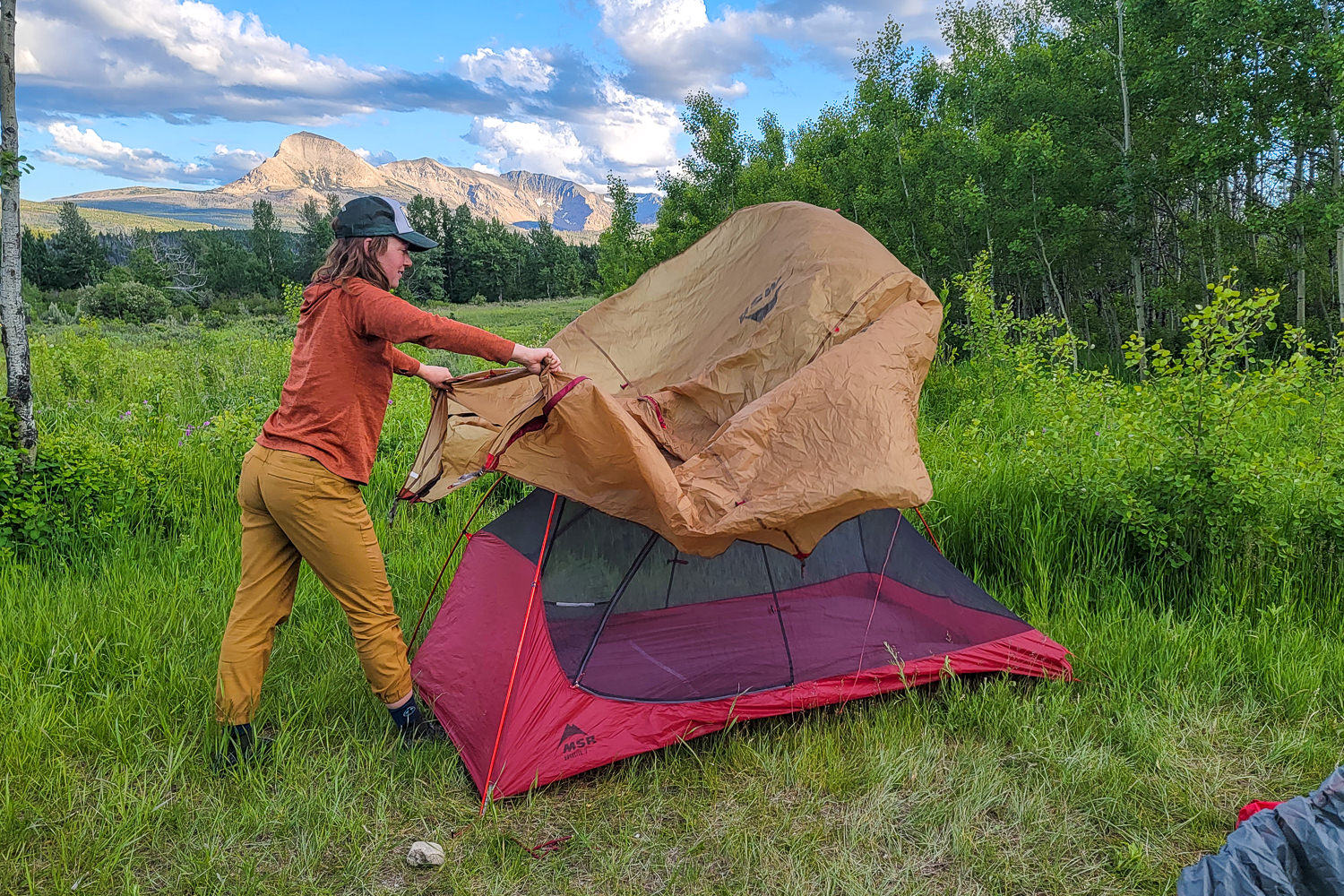
How We Examined
Our staff at CleverHiker has used the 2-Particular person fashions of the Huge Agnes Tiger Wall, NEMO Hornet OSMO, and MSR FreeLite tents for greater than half a decade in very rugged path circumstances. We’ve pushed the bounds of those tents from the dry warmth and scorching wind of Bryce Canyon, Utah to the chilly, moist storms of Olympic Nationwide Park, and relied on them for robust, multi-day adventures to a months-long thru-hike of the CDT.
Most just lately, we put these three tents by means of the wringer on a five-day expedition within the difficult Sawtooth Wilderness. We encountered late September rain, snow, and sub-freezing temperatures. Years of expertise and testing in these numerous circumstances have allowed us to evaluate and scrutinize each factor of those tents in real-life backcountry eventualities the place reliability, sturdiness, and luxury matter essentially the most.
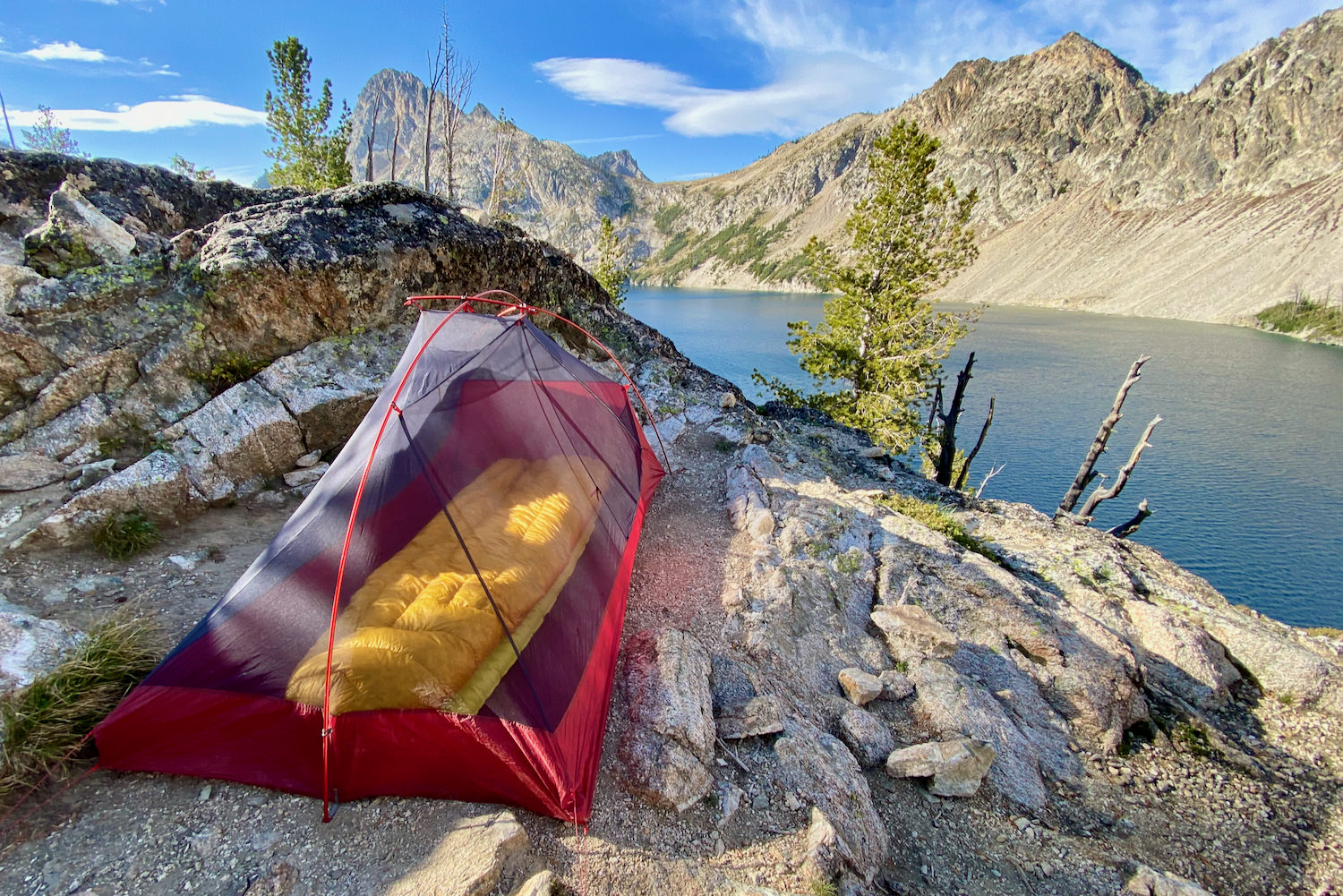
Fashions We Examined
We’ve additionally examined – and actually like – the 3-person variations of those tents. This information focuses on the favored 2-person variations, however many of the execs/cons stay the identical for the 3P fashions. In case you normally backpack with a associate and like a bit extra inside area in your shelters, the 3-person variations of every of those tents are additionally glorious and are nonetheless very mild.
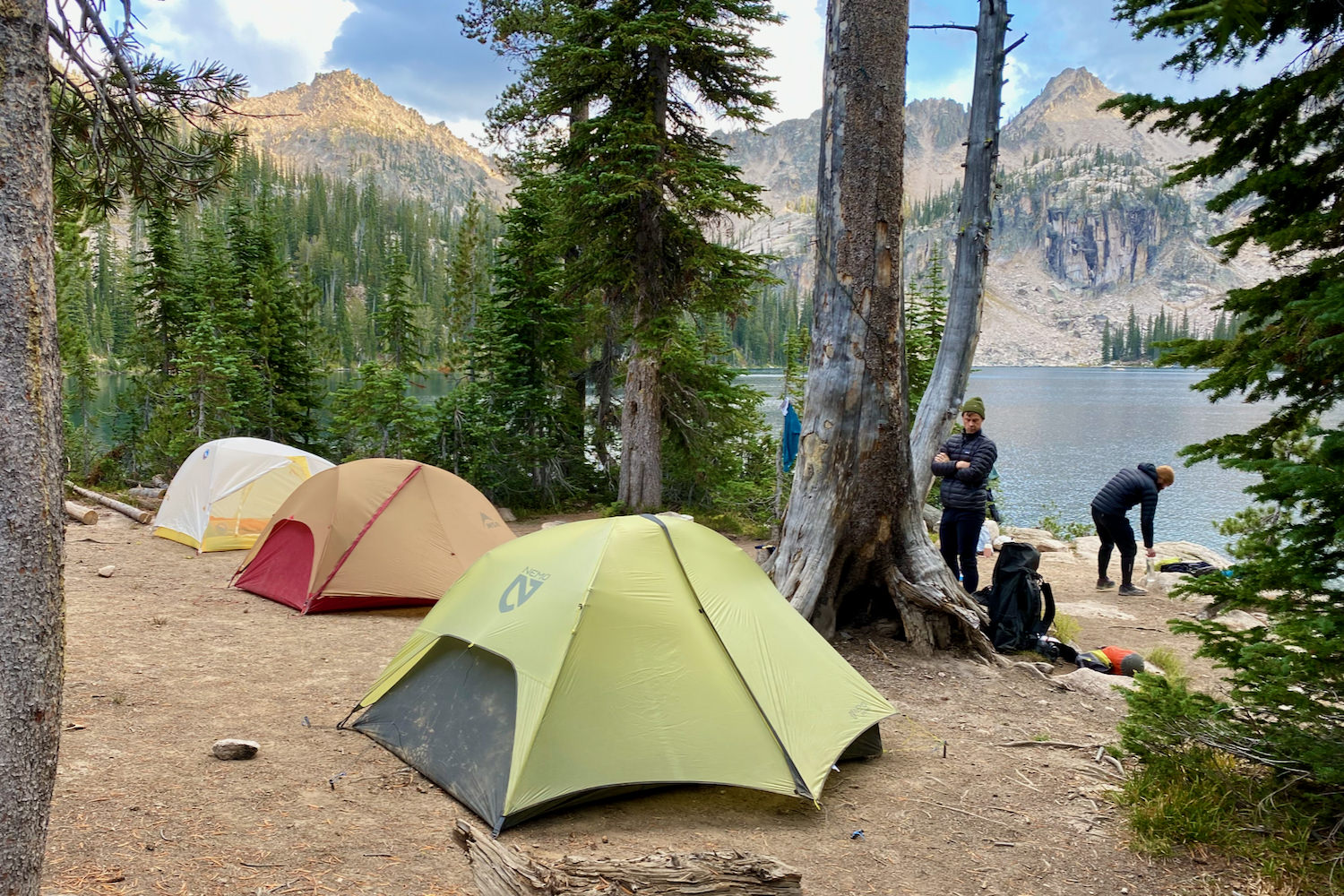
| oSort | Product | Worth | Weight | Dimensions (LxWxH) | Sort | Ground Space | Vestibule Space | Pockets | Packed Measurement |
|---|---|---|---|---|---|---|---|---|---|
| 0 |
Huge Agnes Tiger Wall 2 View at REI View at Amazon |
$450 | 2 lb. 8 oz. | 86 x 52/42 x 39 in. (wider at head, narrower at foot) | Semi-freestanding | 28 sq. ft. | 8 + 8 sq. ft. | 4 | 18 x 5.5 in. |
| 1 |
MSR FreeLite 2 View at REI View at Amazon |
$450 | 2 lb. 5 oz. | 84 x 50 x 39 in. | Semi-freestanding | 29 sq. ft. | 7.5 + 7.5 sq. ft. | 3 | 18 x 4.5 in. |
| 2 |
NEMO Hornet OSMO 2 View at REI |
$430 | 2 lb. 8 oz. | 85 x 51/43 x 39 in. (wider at head, narrower at foot) | Semi-freestanding | 27.5 sq. ft. | 7.1 + 7.1 sq. ft. | 2 | 12.5 x 7.5 x 3.5 in. |
Scoring
We ranked the Huge Agnes Tiger Wall UL 2, NEMO Hornet OSMO 2, and MSR FreeLite 2 based mostly on a easy scoring system:
- 1 level for each part the tent wins
- 1 level for all tents if there’s a 3-way tie
The tent with the best rating wins.
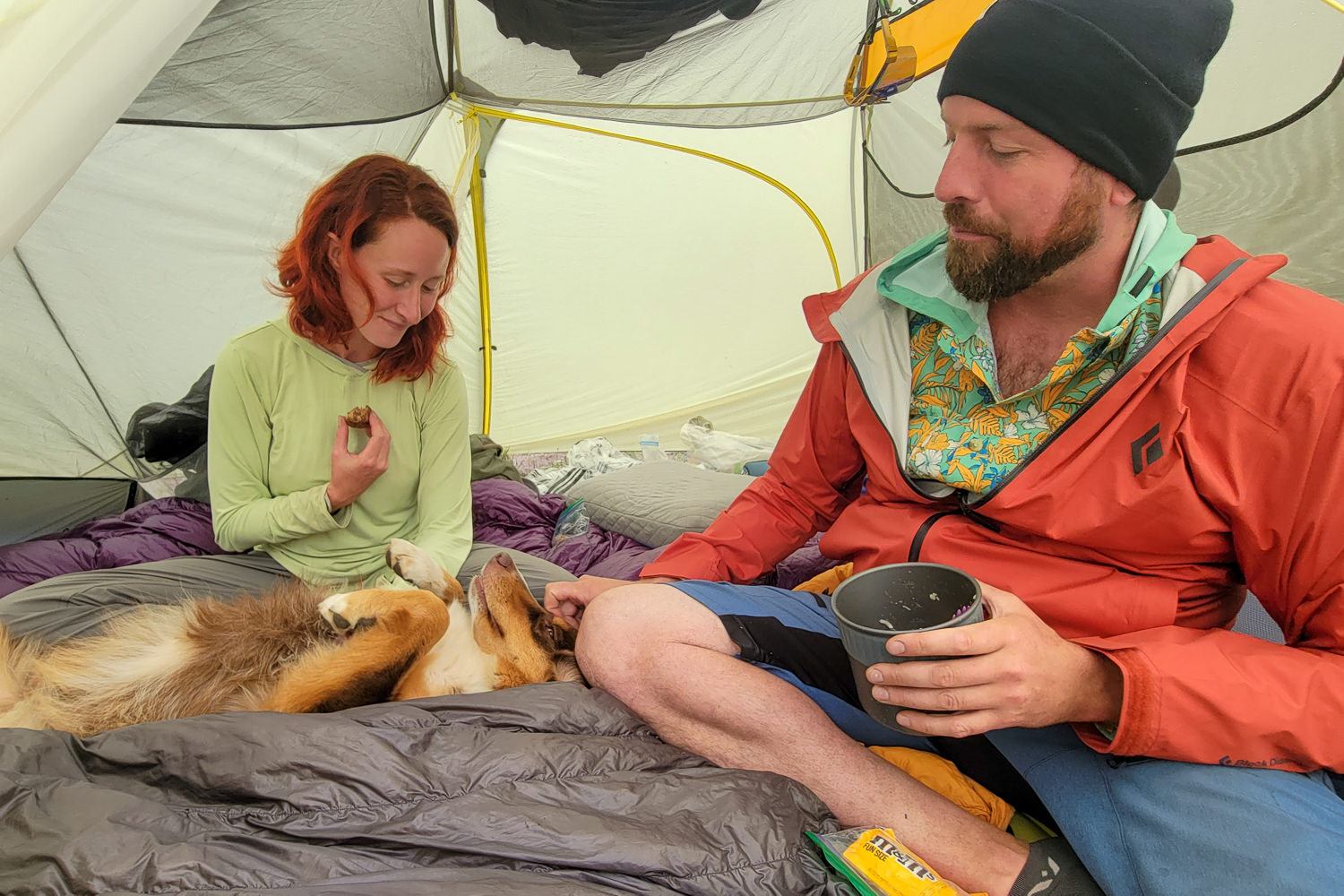
Worth
The Huge Agnes Tiger Wall UL 2, NEMO Hornet OSMO 2, and MSR FreeLite 2 signify phenomenal worth for ultralight user-friendly shelters. These tents cater to hikers planning a protracted trek or thru-hike however aren’t able to half with the comforts and middle-tier pricing of a double-wall tent.
There are extra reasonably priced double-wall tents available on the market, however they are usually fairly a bit heavier. There are additionally lighter shelters on the market, however they are usually single-wall non-freestanding tents that usually use costly cloth like Dyneema Composite Cloth (DCF). These three semi-freestanding tents land within the center for pricing, however are nonetheless impressively mild, simple to make use of, and supply very good climate safety.
Try the value comparability desk in our Finest Backpacking Tents Information to see how these tents stack up towards the opposite high shelters available on the market. The Huge Agnes Tiger Wall UL 2, NEMO Hornet OSMO 2, and MSR FreeLite 2 are priced within the mid to low 400s, which locations them slightly below common for worth. They’re cost-effective for being so light-weight and feature-rich.
MSRPs
- NEMO Hornet OSMO – $430
- MSR FreeLite – $450
- Huge Agnes Tiger Wall – $450
Winner: NEMO Hornet OSMO
The NEMO Hornet OSMO wins this class by $20, with a tie for second place. However we wouldn’t suggest making your alternative based mostly on worth alone. As a result of these tent costs are so shut, think about specializing in which tent options are crucial to you. On the finish of the day, an additional $20 can be cash nicely spent if the tent matches your wants higher in the long term.
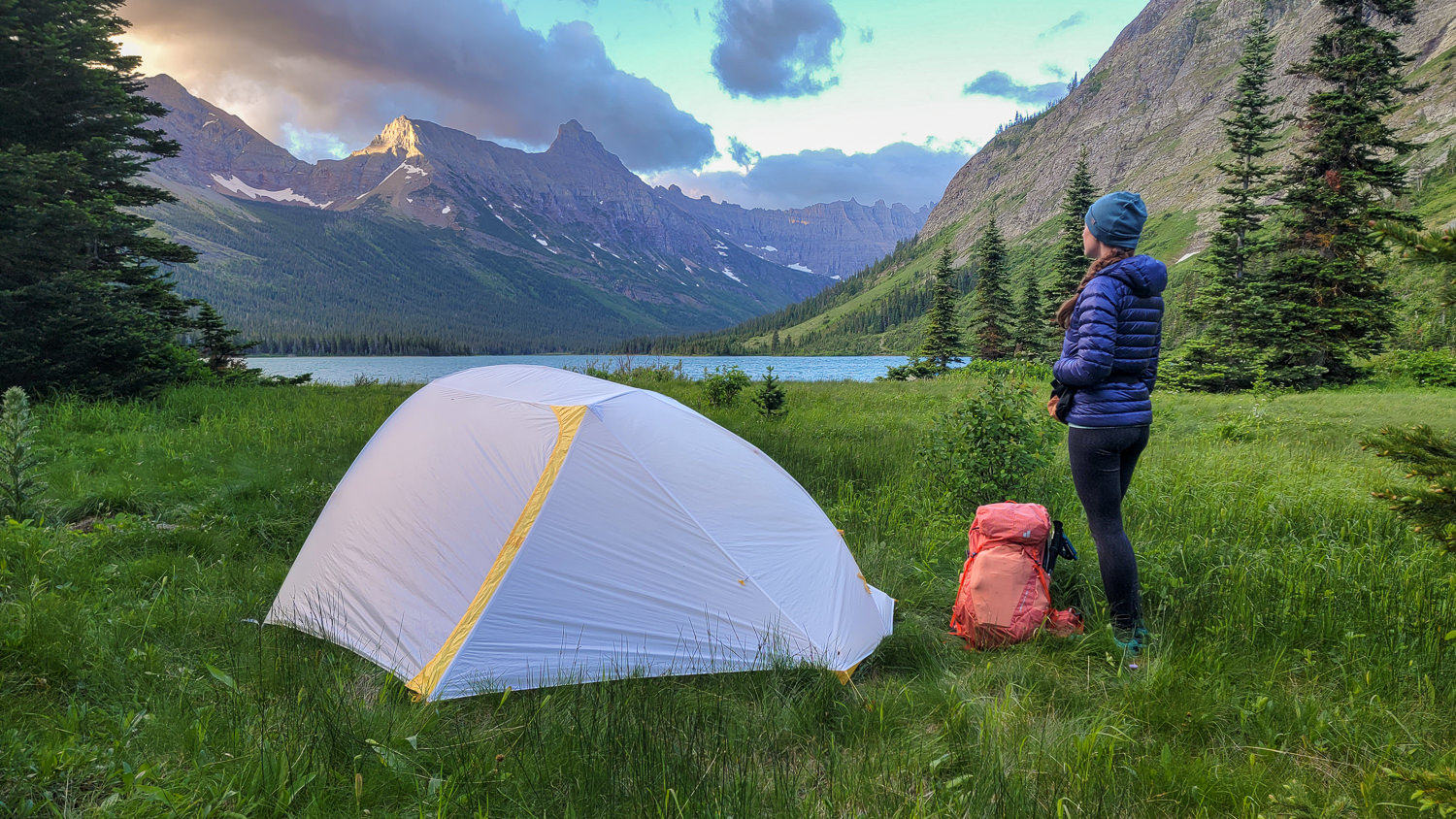
Packaged Weight
These tents are impressively mild. Check out the burden comparability desk in our Finest Backpacking Tents Information to see how they evaluate to our different high picks. The Huge Agnes Tiger Wall UL 2, MSR FreeLite 2, and NEMO Hornet OSMO 2 are close to the entrance of the pack for weight. That’s why each earns a spot in our Finest Backpacking Tents Information or Finest Ultralight Tents Information: they’re simple to hold for prolonged intervals.
To match tents, we use their packaged weight. Packaged weight is the overall mass of the tent because it’s bought by the producer. That quantity normally contains the tent, rainfly, stakes, and guylines.
- MSR FreeLite – Packaged Weight – 2 lb. 5 oz.
- NEMO Hornet OSMO – Packaged Weight – 2 lb. 8 oz.
- Huge Agnes Tiger Wall – Packaged Weight – 2 lb. 8 oz.
Winner: MSR FreeLite
The MSR FreeLite wins this class by three ounces, with a tie for second place. Three ounces isn’t nothing relating to backpacking gear weight, and that would issue into your shopping for choice. Nevertheless, take into account that three ounces is only a bit extra weight than a snack bar, so selecting a tent with the options you need might simply be extra essential.
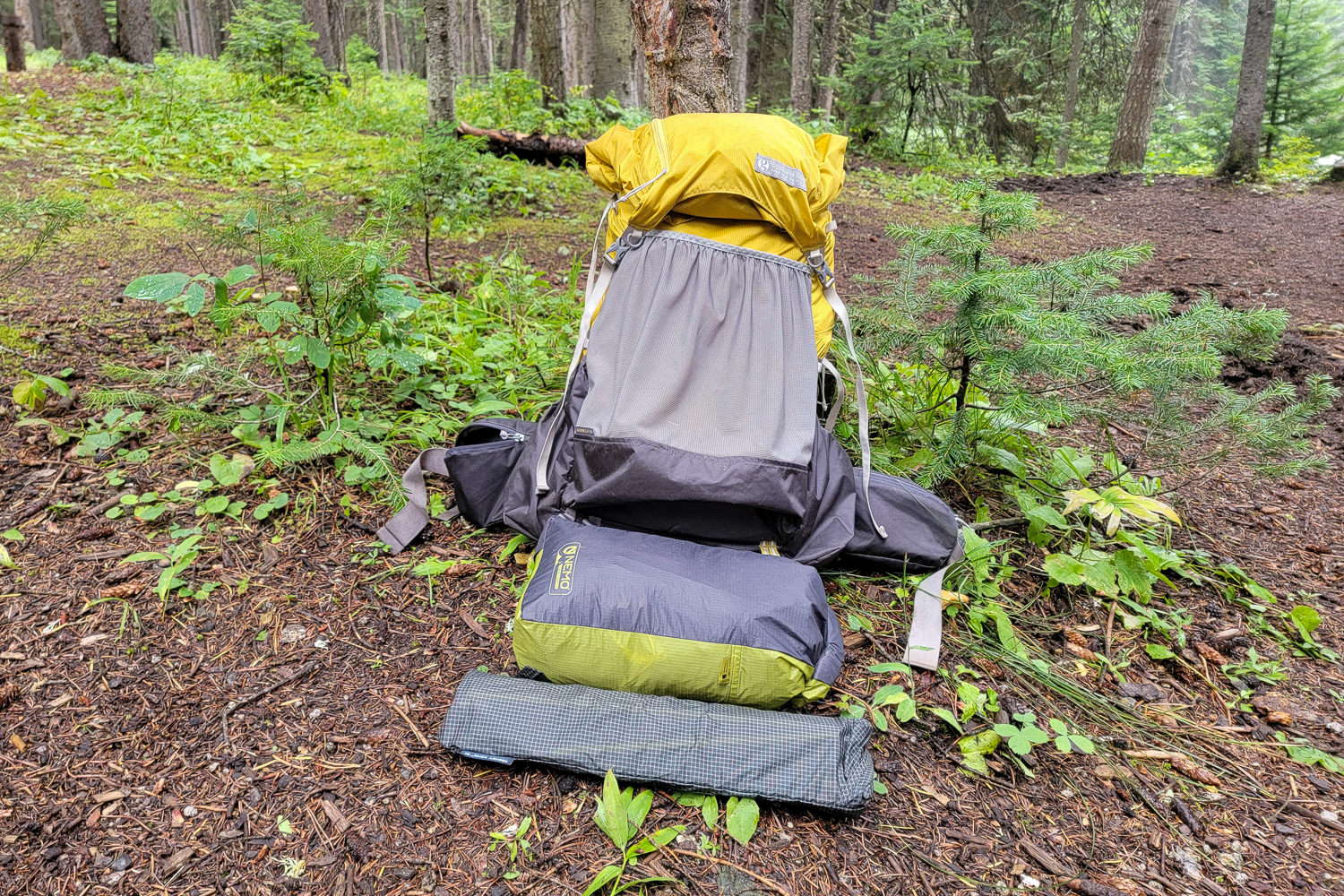
Inside Area
We expect the Huge Agnes Tiger Wall UL 2, NEMO Hornet OSMO 2, and MSR FreeLite 2 usually work higher as solo shelters. As a result of all three tents prioritize low weight, we discovered their interiors had been small for 2 average-sized adults. In case you’re backpacking with a associate or a canine, we suggest sizing as much as the 3-person variations of any of those tents for extra room.
Inside area of the tents is measured as follows: L x W [head / foot] x H [peak]). Observe that the Tiger Wall and Hornet each are wider on the head and extra slim on the toes, in order that they have two width measurements. The FreeLite is rectangular, so it has one.
Huge Agnes Tiger Wall – 86 x 52/42 x 39 in.
The Tiger Wall gives essentially the most inside area of the three tents. It has the longest forehead pole, which pulls the edges of the inside mesh practically vertical. Which means you’ll have considerably extra headroom than the FreeLite or the Hornet to sit down up and transfer round.
Due to this spacious headroom, the Tiger Wall is the one tent on this listing we expect is cheap for 2 folks. It’s nonetheless a good area to share, however we discovered it was the least cramped of the three tents, particularly if customers are on the shorter or smaller aspect. For more room, think about sizing as much as the 3-Particular person model of the Tiger Wall.
MSR FreeLite – 84 x 50 x 39 in.
The MSR FreeLite has extra inside area than the Hornet, however not as a lot because the Tiger Wall. One key distinction of the FreeLite is its totally rectangular ground, which gives more room than the Tiger Wall or Hornet when mendacity down subsequent to a associate. We discovered the ground area of the FreeLite was just like heavier freestanding, 2-person backpacking tents. This design additionally provides more room for inside gear storage.
Nevertheless, the FreeLite’s forehead pole is shorter than the one on the Tiger Wall (though longer than the Hornet). Which means the FreeLite’s partitions slant inward, slicing out treasured headroom that two folks want for livable area in a shared shelter.
For that cause, the FreeLite is extra snug as a solo shelter, fairly than sharing with a associate. It might work nicely for 2 smaller or shorter hikers who’re okay with much less headroom, and it’s a wonderful tent alternative for solo use.
NEMO Hornet OMSO – 85 x 51/43 x 39 in.
NEMO’s Hornet has the least inside area in comparison with the Tiger Wall and the FreeLite. NEMO makes use of quick forehead clips as an alternative of an extended forehead pole, so the partitions are slim and are available practically to some extent on the ceiling. This design eliminates many of the potential headroom that the Tiger Wall and FreeLite provide.
The Hornet’s ground space is the most important of the three tents, which is okay once you’re mendacity down. Nevertheless, we discovered the slim partitions made it robust for 2 folks to sit down up with out brushing the aspect of the tent or bumping into the opposite individual. You could possibly match two folks in a pinch, however it’s tight.
Additionally, the Hornet is just not nice for backpackers over six toes tall. Our tallest hiker was 6’2”, they usually discovered the 2-person Hornet was too slim for consolation over an prolonged time, whilst a solo shelter.
We extremely suggest the 2-person Hornet for solo backpackers which can be beneath 6 toes tall. For taller hikers, we propose the 3-person model of this tent. In truth, we just like the 3-person NEMO Hornet OSMO a lot that we favor it over the 3-person FreeLite or the 3-person Tiger Wall.
Winner: Huge Agnes Tiger Wall
The Huge Agnes Tiger Wall is the clear winner of this part. Its longer forehead pole creates a much bigger inside area and gives considerably extra headroom than the opposite two shelters. The FreeLite is available in second place with a usable however narrower inside, and the Hornet is available in third as a consequence of an absence of headroom for 2 folks.
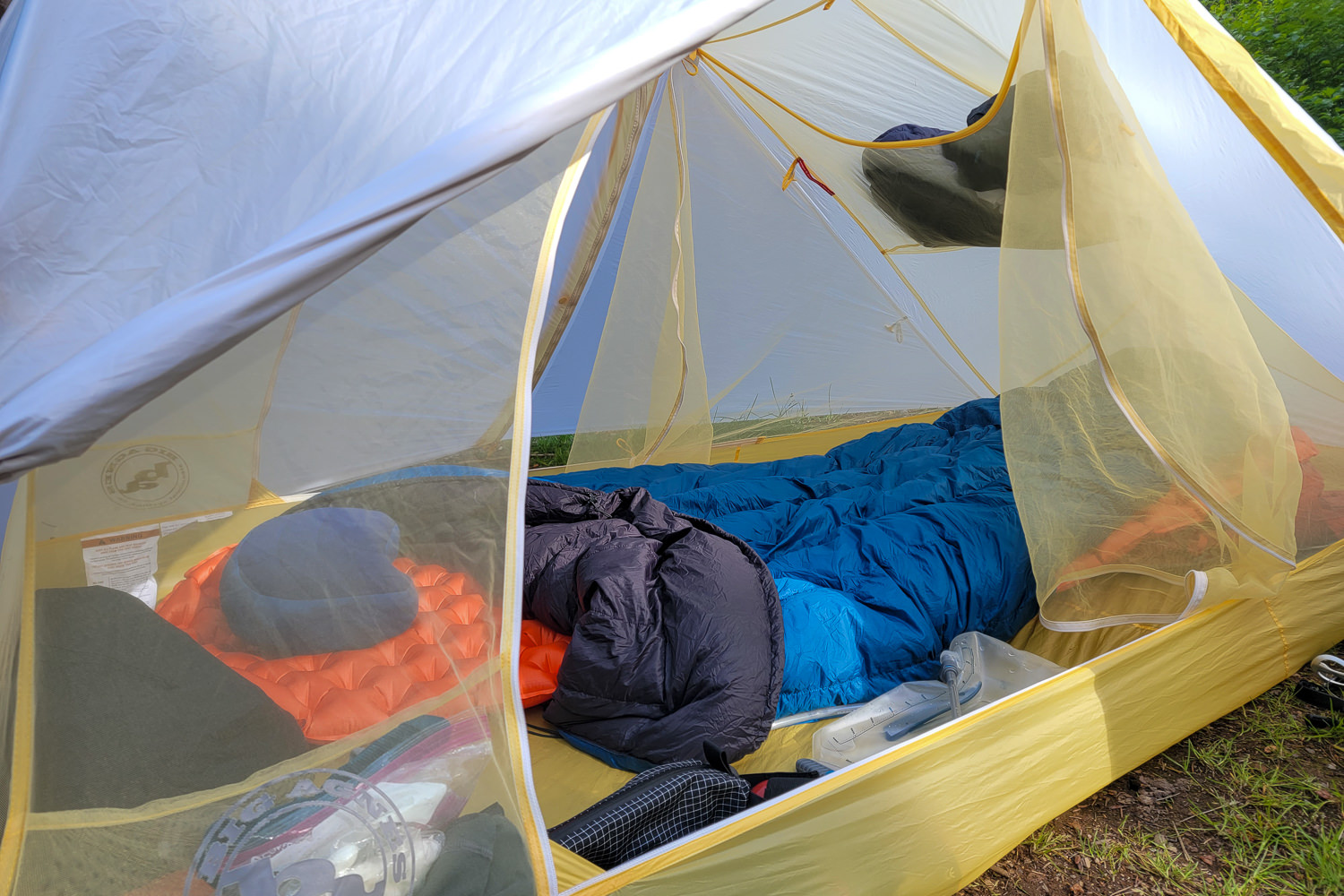
Ground Space
Ground dimensions alone aren’t an effective way to measure how roomy a tent is. The construction of the tent poles defines how a lot headroom there can be. Nevertheless, the quantity of ground area remains to be essential. A beneficiant tent ground will present extra room for 2 folks when mendacity down, and as a bonus gives further inside area for storing gear.
To search out the sq. footage of every tent’s ground, multiply the size of the ground by the width. The Tiger Wall and Hornet have a tapered ground form, that means they’re wider on the head and extra slim on the toes. The FreeLite is rectangular.
- MSR FreeLite – 29 sq. ft.
- Huge Agnes Tiger Wall – 28 sq. ft.
- NEMO Hornet OSMO – 27.5 sq. ft.
Winner – MSR FreeLite
The MSR FreeLite is the champion relating to ground space. At 29 sq. toes, the FreeLite is a sq. foot greater than the Tiger Wall in second place, and a foot and a half greater than the Hornet in third place. The FreeLite’s rectangular ground form provides it a bit extra room than the opposite two, which taper from wider on the head to extra slim on the toes. Nevertheless, it is a small quantity of additional ground area and wouldn’t be sufficient to persuade us to decide on the FreeLite over the opposite tents.
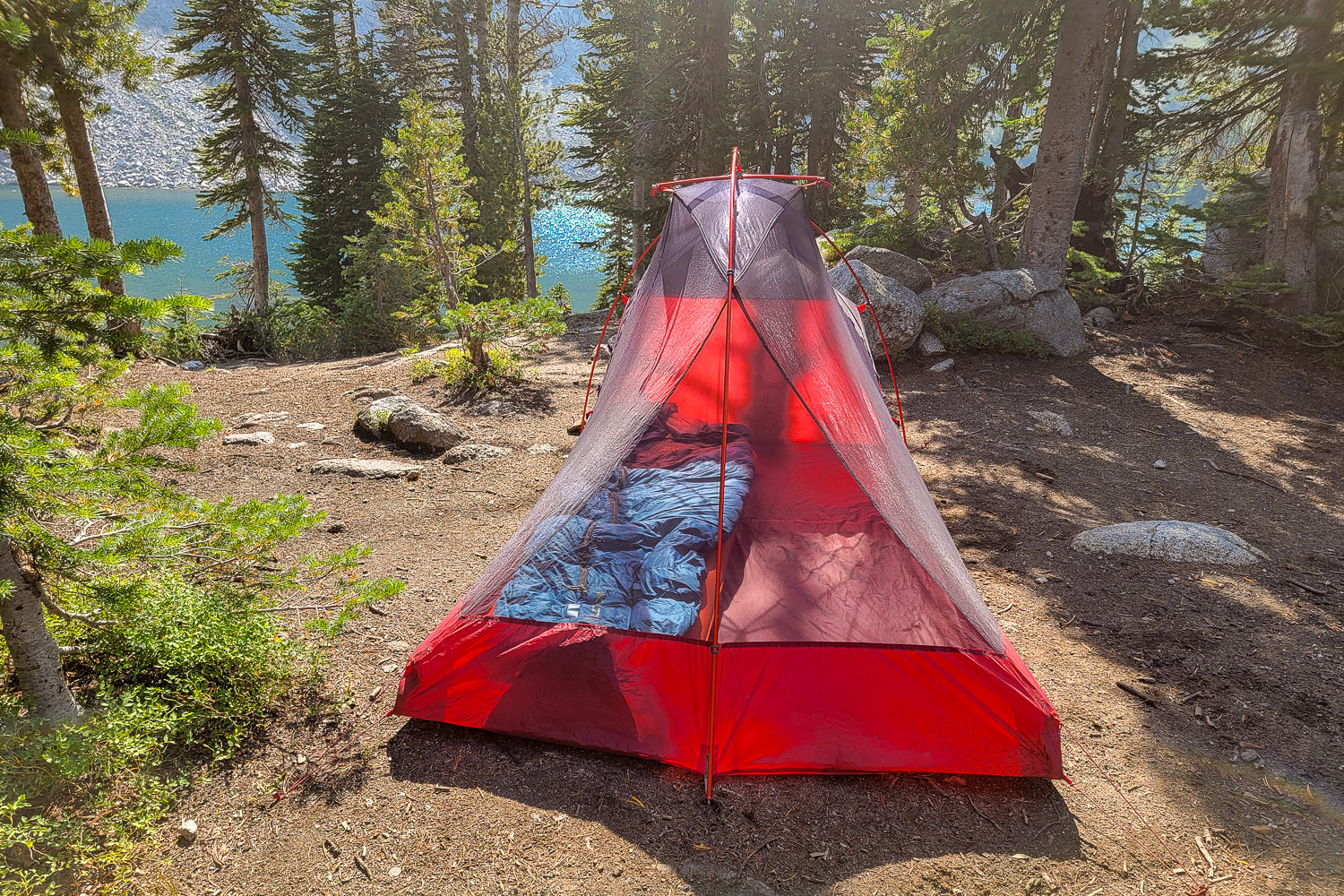
Vestibule Space
The vestibule of a tent helps it really feel extra snug and livable. Vestibules present a dry designated place to retailer smelly sneakers, tools, and ponderous backpacks. It’s additionally important for offering climate safety by blocking wind, solar, and rain. A roomy vestibule lends extra versatility to a tent as nicely: it may possibly present extra seating, act as a personal area to alter garments and provide shelter when cooking and consuming.
- Huge Agnes Tiger Wall – 8 + 8 sq. ft.
- MSR FreeLite- 7.5 + 7.5 sq. ft.
- NEMO Hornet OSMO – 7.1 + 7.1 sq. ft.
Winner – Huge Agnes Tiger Wall
The Huge Agnes Tiger Wall wins for the largest vestibule. It has the most important vestibule space of the three tents, with virtually a sq. foot greater than the Hornet in third place. Despite the fact that the Hornet’s vestibule area felt extra slim, these tents are all inside 6 to 12 sq. inches of one another. Total, these tents provide average-sized vestibules for backpacking tents. We didn’t have hassle discovering area to retailer our gear. The Tiger Wall’s s further vestibule area is sweet, however the barely smaller vestibules of the opposite tents wouldn’t be a dealbreaker in our purchasing choice.
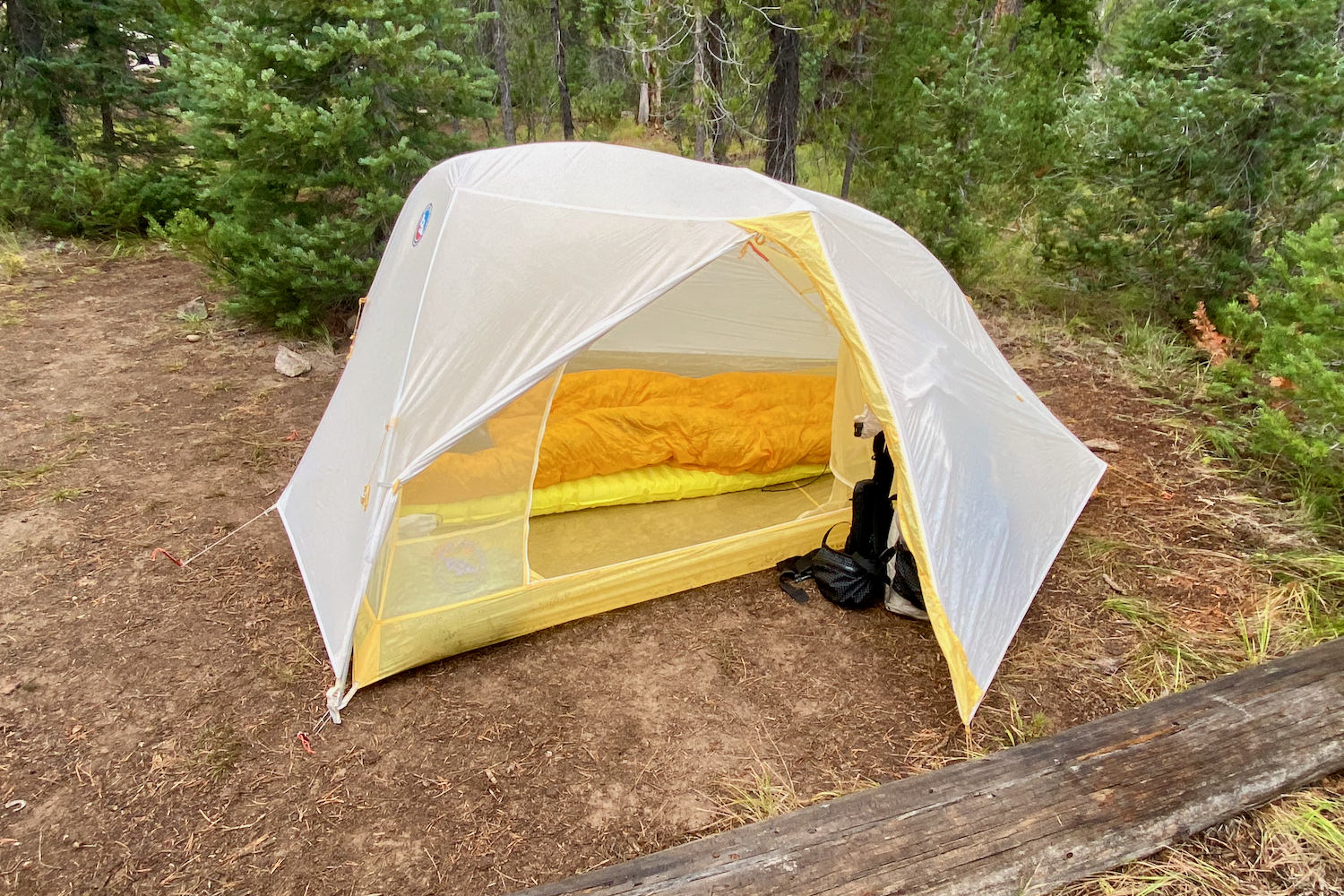
Pockets
Shelter storage and group are very important when tenting. Effectively-designed tent pockets ought to fluctuate in measurement and be strategically positioned all through the tent that can assist you keep organized. Pockets make it simple to rapidly entry necessities once you want them, whether or not it’s a multitool or a map, and may hold your shelter clutter-free whereas maximizing area.
Huge Agnes Tiger Wall – The Tiger Wall has 4 complete pockets, essentially the most of all three tents. It options two handy rectangular pockets close to the pinnacle of the tent, excellent for storing necessities like a headlamp or chapstick. It additionally has a large overhead storage pocket useful for storing objects like a hat or cellphone.
What makes the Tiger Wall distinctive is the spacious loft pocket on the foot of the tent. It’s the one tent of the three that gives a pocket this massive and on this location. The loft pocket is positioned within the foot space that isn’t used to sit down up, so we discovered this extensive, stretchy storage is ideal for stashing jackets or different garments with out leaving them piled on the ground or in a vestibule.
MSR Freelite – The Freelite has 3 pockets. It options two distinctive triangular pockets on the head of the tent for neatly storing gear you wish to hold shut. The triangle pockets have a handy characteristic: a gap on the backside to run a charging wire out of your energy financial institution to your cellphone. We discovered the pockets had been simply large enough to stash nearly all of our small important objects. Nevertheless, for those who want extra room, the Freelite additionally has two generously sized overhead pockets which can be sensible for stashing bulkier issues like mild layers or stuff sacks.
NEMO Hornet OSMO – The Hornet gives simply 2 medium overhead pockets. It doesn’t have low aspect pockets like the opposite tents provide, so that you’ll have to search out some place else to place your sun shades, earplugs, and toiletries. As an alternative, the 2 small overhead pockets provide the one storage within the tent, however they’re simply inside arm’s attain. These pockets are product of a particular light-dispersing materials to transform your headlamp into an ambient tent lamp. We discovered this minimal pocket design supplied restricted room for a handful of things, however nothing else.
Winner: Huge Agnes Tiger Wall
The Tiger Wall wins first place for a considerate pocket format that we discovered very handy and helpful. With 4 pockets of various sizes, the storage within the Tiger Wall assured we’d have ample room for organizing gear. We particularly appreciated the massive loft pocket to maintain jackets off the ground. MSR’s FreeLite pockets had been additionally purposeful and useful, however in third place, the Hornet was missing. Its minimalist storage choices left us wanting extra.
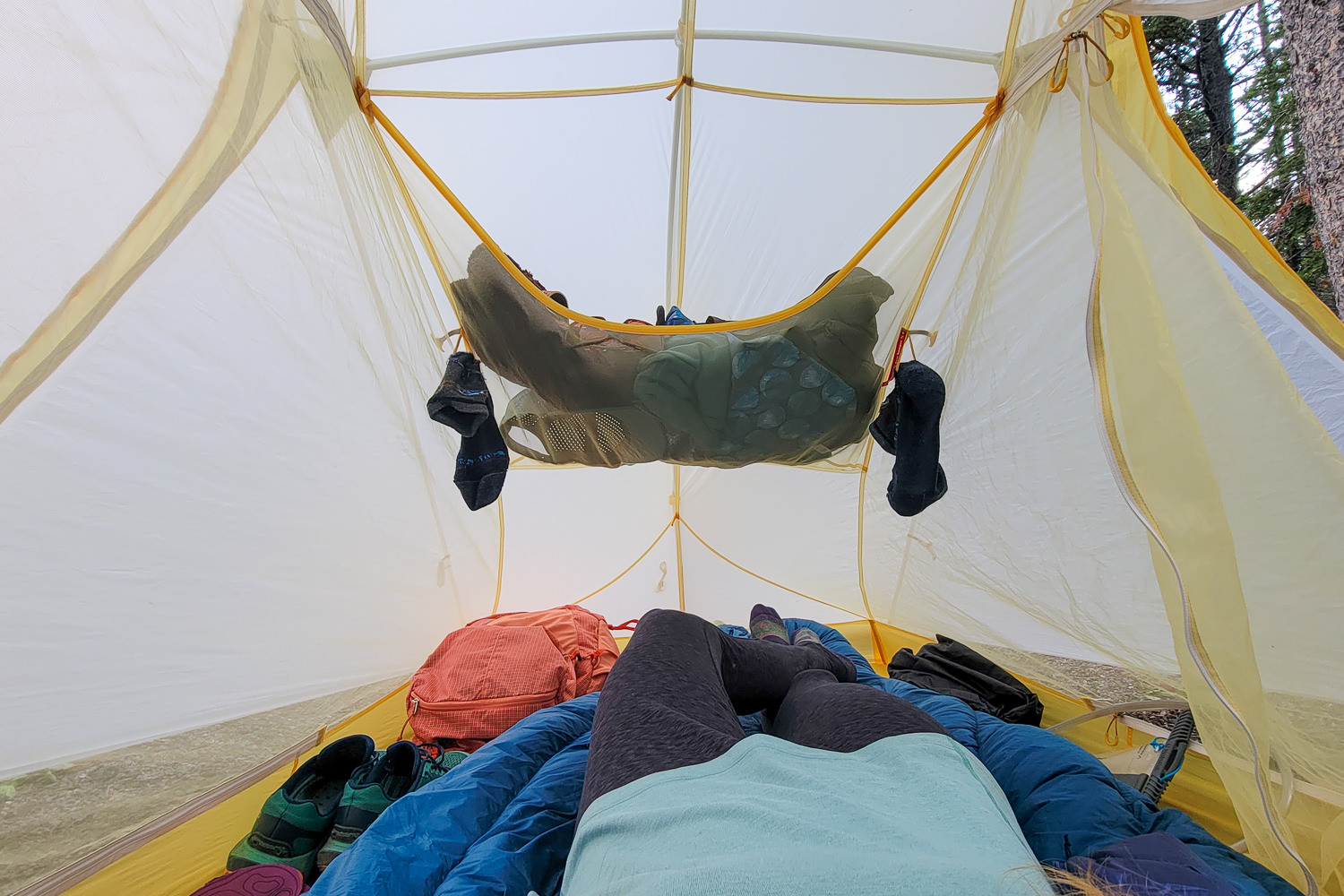
Climate Resistance
You’re certain to run into unpredictable and difficult climate when backpacking. Nevertheless, these tents will hold you as protected and dry from the rain, wind, and even mild snow as any heavier freestanding shelter.
All three tents are constructed with ripstop, waterproof nylon blends and embrace guylines to safe your shelter in excessive winds. All of them embrace an extra remedy of DWR, silicone, and/or polyurethane to shed water.
Semi-freestanding tents constructed from nylon do have some downsides. They’re extra inclined to excessive wind due to the minimal pole construction. As well as, all three tents are likely to sag in chilly and moist climate due to their nylon building. On the whole, nylon doesn’t maintain form in addition to a DCF shelter, sil-nylon, or a thicker, extra sturdy materials. As a result of the nylon utilized in these three tents is thinner and the foot of the tent is staked out, you’ll seemingly must re-tension your guylines and re-stake your tent as inclement climate strikes in and the fabric sags.
Huge Agnes Tiger Wall – The Tiger Wall excels in climate safety due to its full-coverage fly and lengthy forehead pole. The place the Hornet and FreeLite each have one aspect the place the rainfly is reduce out, the Tiger Wall’s fly extends to the bottom on all sides, making certain moisture is stored at bay. The Tiger Wall additionally has six guylines, two greater than the others, for much more stability and resistance to sturdy winds. Due to Huge Agnes’ distinctive dying strategies, the Tiger Wall is UV resistant and received’t lose shade as rapidly because the Hornet or FreeLite.
We discovered the fabric of the Tiger Wall sagged many of the three tents when it got here to chilly and moist circumstances. We had been by no means involved that the fabric would fail, and the tent was superior at protecting out moisture, wind, and the weather, however you might want to regulate the strain of the guylines as temperatures drop and the rain picks up.
NEMO Hornet OSMO – The Hornet’s tent materials sagged the least. We discovered NEMO’s polyester and nylon cloth mix, known as OSMO, didn’t droop as a lot because the others in rain, snow, wind, or below-freezing temperatures. Just like the FreeLite, it gives 4 guy-out factors.
Sadly, the slim forehead clips on the high of the tent don’t present a lot protection from rain when getting out and in of the tent. Which means the vestibules and inside tent are vulnerable to getting sprinkled when doorways are open throughout a storm. The 4 guyline attachment factors are useful for protecting moisture out.
One other draw back is that just like the FreeLite, the Hornet has a single-wall part on the head of the tent the place the rainfly is reduce out, turning simply the foot space right into a single-wall tent. We discovered this was a uncommon concern and the tent dried rapidly, however in moist and chilly climate, this lack of rainfly protection drew extra condensation than the remainder of the tent.
MSR FreeLite – The FreeLite makes use of “rain gutters” on the rainfly. These are flaps positioned subsequent to the zippers that run from the highest of the tent to the underside of the rainfly to assist information moisture away. This is able to be particularly useful when opening the tent after a storm since water nonetheless on the rainfly doorways would roll in direction of the zipper and into the vestibule.
On paper, it is a nice characteristic. In apply, we didn’t discover that the rain gutter was any extra environment friendly at shedding water than the Tiger Wall or Hornet.
Just like the Hornet, the FreeLite additionally has 4 guy-out factors and a single-wall part on the foot of the tent the place the rainfly is reduce out to save lots of weight. We discovered this space gathered extra condensation than the remainder of the tent, however it wasn’t a big concern. The FreeLite stored out rain and blocked wind.
Winner: Three-Approach Tie
This can be a three-way tie. We discovered all three tents had been comparable and really dependable in rain and wind. They every stand out for a unique cause: the Tiger Wall has a full-coverage rainfly, the Hornet sags much less in chilly and moist climate, and the Freelight provides a gutter designed to assist shed water. These tents have stored us reliably dry, and our gear protected within the vestibules, it doesn’t matter what the circumstances had been outdoors.
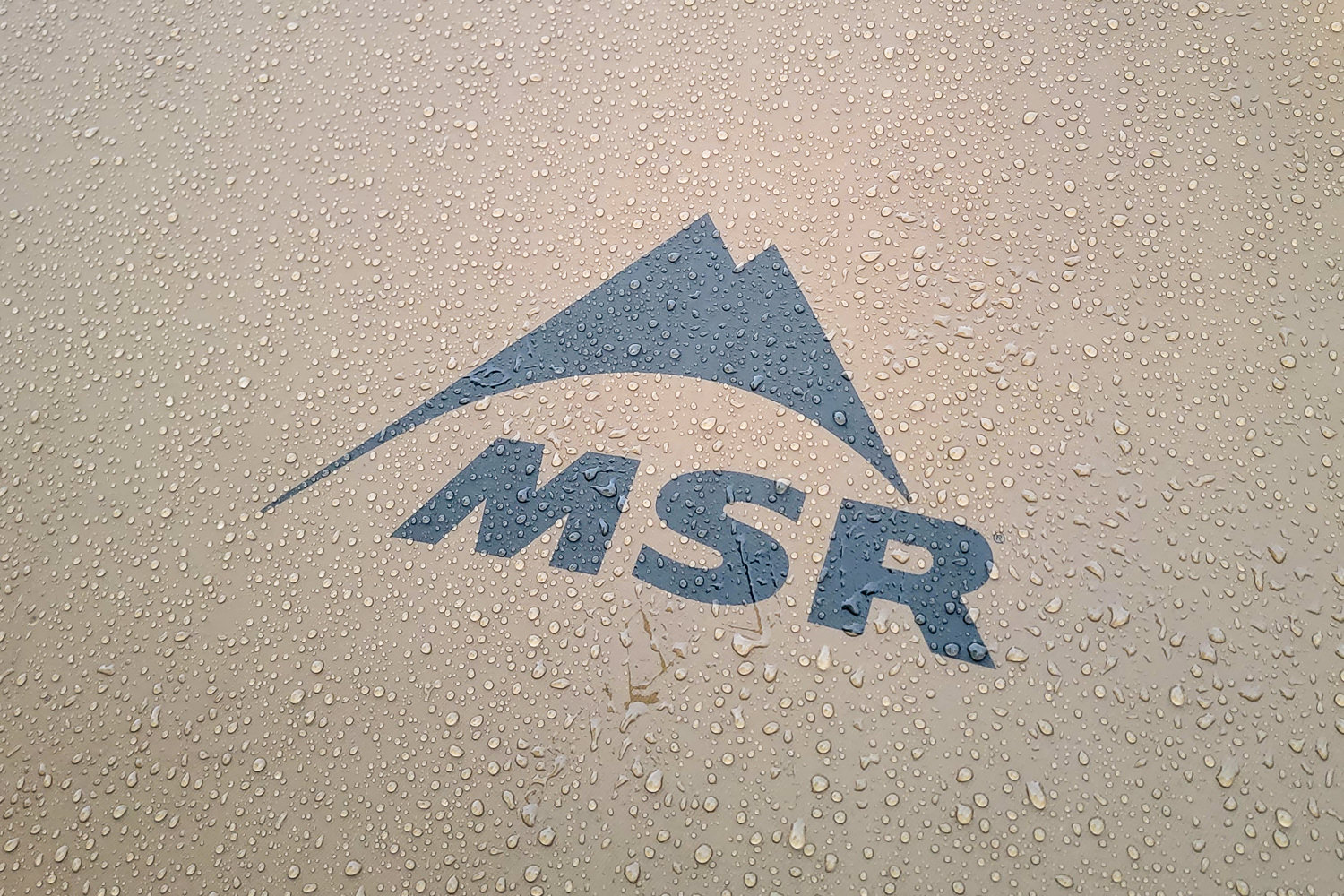
Sturdiness
These tents prioritize low weight over sturdiness. The Huge Agnes Tiger Wall UL 2, NEMO Hornet OSMO 2, and MSR FreeLite 2 aren’t burly by design: they use slim aluminum poles and skinny cloth to supply main weight financial savings for ounce-conscious backpackers.
Denier is a strategy to measure not solely how thick or dense a cloth is, however how sturdy will probably be. When a denier quantity is excessive the tent cloth is stronger, tougher to see by means of, and heavier. At decrease denier values, cloth is lighter, extra clear, and fewer sturdy.
All three tents use 10 and 15 denier ripstop nylon (or a coated nylon mix) for the ground and rainfly, and polyester for the mesh. 15D is barely barely extra sturdy than 10D, however each are ultralight and impressively weather-resistant. It’s price noting these supplies are as mild and skinny as you may probably go with out sacrificing all sturdiness, and 10D and 15 materials are customary on most ultralight tents.
It’s true {that a} motivated critter might chew by means of the fabric on any of those tents to achieve a late-night snack in your shelter. We’ve additionally discovered {that a} rogue department or sharp rock can do some actual harm for those who don’t choose a transparent campsite. We extremely suggest buying the coordinating footprint or a sheet of Tyvek dwelling wrap for all three fashions so as to add an additional layer of safety between you and muddy, moist, or tough terrain. In case you’re arduous in your gear or on the lookout for a brilliant sturdy backcountry shelter, these tents will fall quick.
Nevertheless, we’ve discovered that with common upkeep and preventative care, all three tents can and can final a few years. To increase the lifetime of your shelter, see our information How To Care For Your Tent: Cleansing, Restore, & Storage Suggestions.
MSR FreeLite – The FreeLite felt safe in all climate due to a thicker tent materials. Just like the Tiger Wall, it makes use of 15-denier nylon for all elements of the tent: rainfly, partitions, and ground. That is an incremental distinction in materials thickness that gives a bit extra sturdiness.
The FreeLite additionally options 4 guylines, one for every nook, so as to add stability in excessive winds. Moreover, MSR makes use of metallic grommets for the tent pole ends to nestle, whereas the Hornet and Tiger Wall use plastic. We’ve by no means had a problem with plastic grommets, however it is a small factor that would add longer life to the FreeLite.
NEMO Hornet OSMO – The Hornet is sturdy due to its proprietary OSMO materials. This can be a mix of polyester and nylon that outperformed the FreeLite and Tiger Wall in moist and chilly climate. The ten rainfly and 15D inside OSMO cloth held its form the very best and sagged the least of those three tents, making it really feel extra sturdy and reliable in storms. Just like the FreeLite, the Hornet additionally has 4 guyline attachment factors. Just like the Tiger Wall, it makes use of plastic grommets for the tent poles. Plastic grommets work nicely and sure save an incremental quantity of weight, however in concept, plastic is extra more likely to break or deteriorate than metallic.
Huge Agnes Tiger Wall – We discovered the Tiger Wall’s materials was the least sturdy of the three tents. Huge Agnes makes use of 15D ripstop nylon, which must be akin to the FreeLite for efficiency in chilly temperatures and rain. It has 6 guyline attachment factors for further safety throughout storms.
However in our expertise, the Huge Agnes cloth sagged the many of the three tents throughout moist climate. We had considerations that the rainfly – which is sort of see-through – was too skinny, however it nonetheless carried out nicely towards moisture and wind. We’d extremely suggest a floor fabric or footprint so as to add longevity to the Tiger Wall specifically. Although it nonetheless labored nicely in all climate, we query the long-term sturdiness of The Tiger Wall’s materials.
Winner – MSR FreeLite
The winner for sturdiness is the MSR FreeLite. Its barely thicker 15D nylon building and use of metallic grommets put it forward of the competitors, making certain an extended lifespan within the open air. The Hornet is in second place and the Tiger Wall is in third.
When it boils all the way down to sturdiness, none of those tents are an ideal alternative. Their light-weight design and high-performance supplies aren’t constructed to final for many years. However the place you sacrifice sturdiness, you acquire portability, and these tents are as mild because it will get.
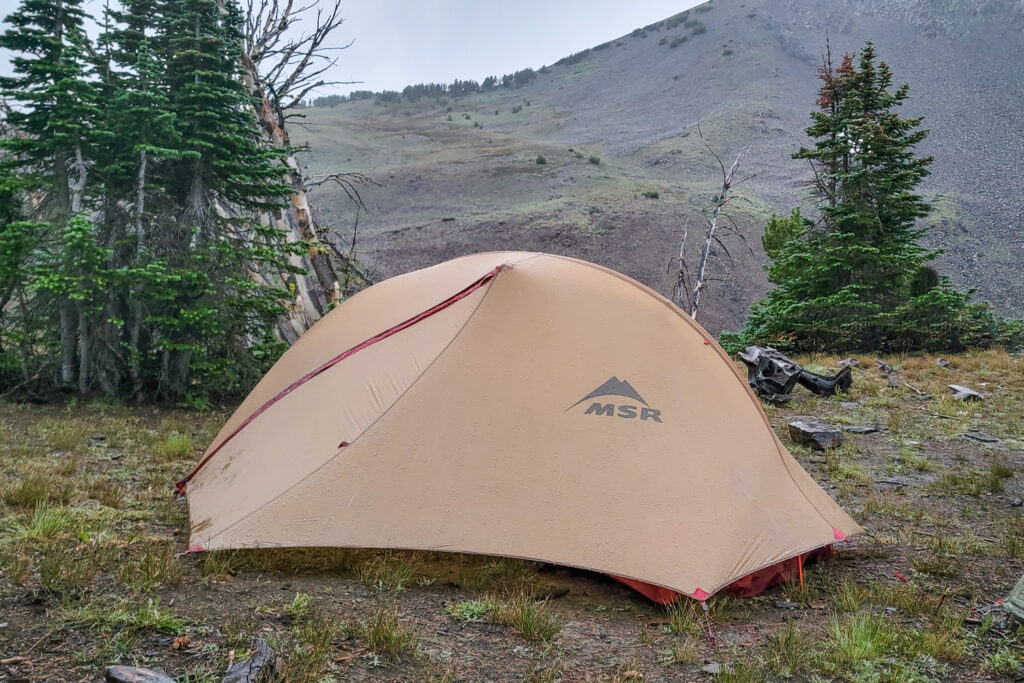
Versatility
A flexible tent enhances a variety of outside adventures. It’s not simple to discover a shelter that retains you simply as snug within the wild backcountry in a single day as a reserved frontcountry web site. Semi-freestanding tents straddle the road between freestanding and non-freestanding choices on this regard.
Freestanding tents – Freestanding tents are essentially the most versatile for sleeping close to an alpine lake or subsequent to your automotive bumper. The load of most freestanding tents makes them purposeful sufficient for backpacking, particularly when splitting the burden with a associate, however feature-rich sufficient for automotive tenting due to ease of use and velocity of setup.
Non-freestanding tents – Non-freestanding tents are the least versatile. They’re designed so simple as potential for backpacking, which is precisely what you want for a low base weight. However for tenting virtually anyplace else, you sacrifice comforts like pockets, headroom, and sturdiness. Non-freestanding shelters don’t make sense anyplace besides the backcountry: they’re costly, essentially the most time-consuming and difficult to pitch, and are recognized to fill with condensation in a single day. Additionally they have a big footprint, since all man strains have to be staked out, to allow them to’t be arrange in as many places.
Semi-freestanding tents – Semi-freestanding tents land in between the 2. Like freestanding tents, their small footprints and few guylines make them simple to arrange anyplace there’s room. In frontcountry and automotive tenting conditions, they received’t present as a lot sturdiness, consolation, or inside area as a typical freestanding tent, however they provide comparable options like pockets, headroom, and climate resistance for versatility past the backcountry. Semi-freestanding tents are simple to make use of due to their easy pole construction, in order that they’re quick to arrange for a first-timer. And like non-freestanding tents, they provide very low weight.
Winner: Three-Approach-Tie
The Huge Agnes Tiger Wall UL 2, NEMO Hornet OSMO 2, and MSR FreeLite 2 are designed at the beginning for light-weight backpacking, however they’re additionally versatile sufficient for the frontcountry. Due to their distinctive mix of low weight, wealthy options, and ease of use, every tent is flexible sufficient to deal with essentially the most punishing months-long thru-hike, however would additionally thrive close to a picnic desk and a hearth pit.
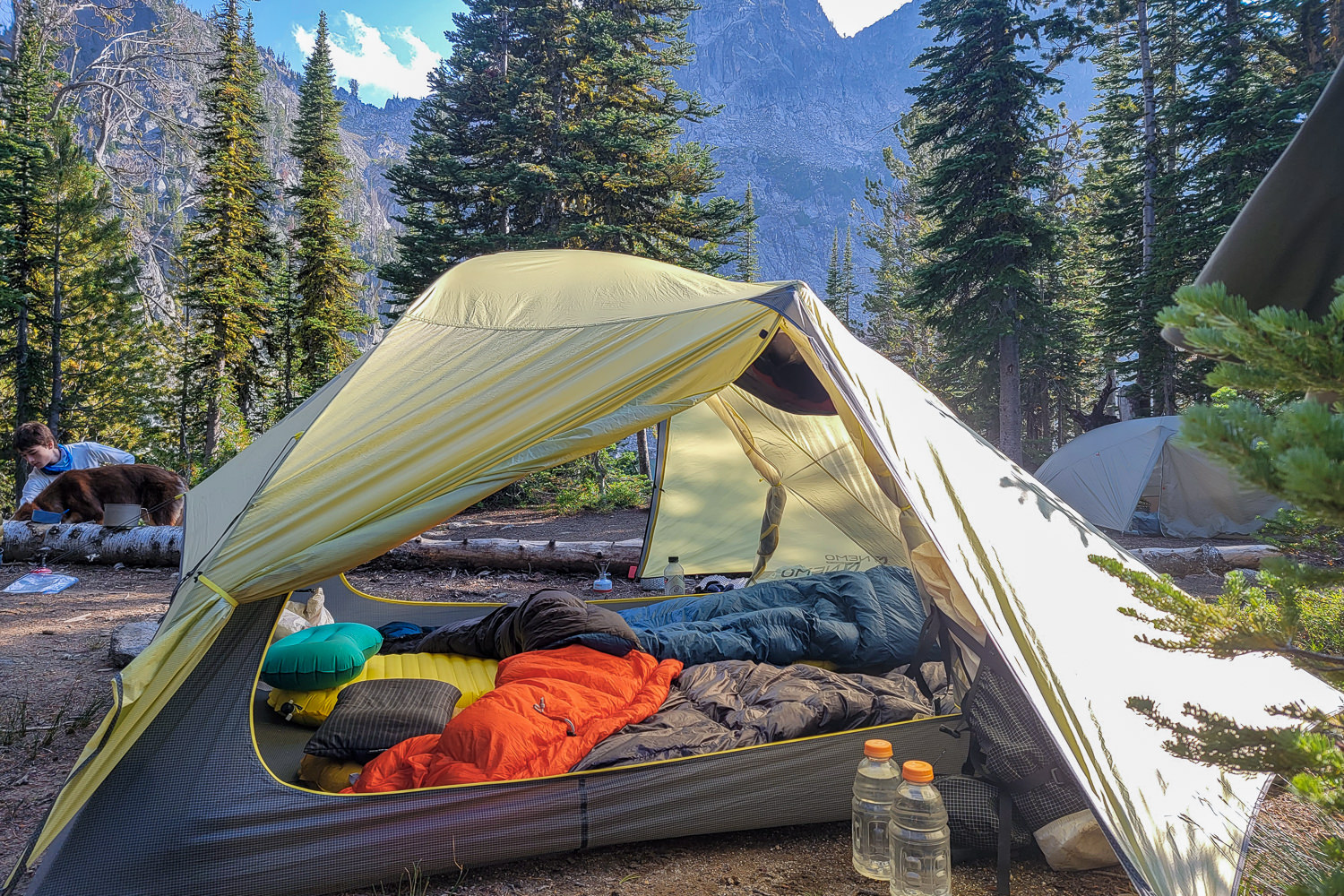
Ease of Use
For ease of use, semi-freestanding tents are the right stability between freestanding tents and trekking pole tents.
Freestanding tents are virtually at all times the quickest and best to pitch since they are often arrange on most terrains. Freestanding tents use acquainted designs and have handy options like color-coordinated buckles and clips that make the shelter setup a breeze.
Trekking pole tents are essentially the most troublesome and time-consuming to arrange. They don’t have a devoted framework of tent poles and depend on your trekking poles because the help level. Which means the steps to attain the “excellent” pitch with guylines and pressure might be advanced and gradual relying on the slope, obstacles, and area out there.
Semi-freestanding tents are quick to arrange since they require being staked out on the foot of the tent. Like a freestanding tent, the uncomplicated pole construction is straightforward to grasp, and the rainfly attachments are intuitive for quick setup or tear down. In contrast to Trekking pole tents, you may pitch semi-freestanding tents in additional places due to the smaller footprint.
Winner – Three-Approach Tie
This can be a three-way tie. We discovered the Huge Agnes Tiger Wall, NEMO Hornet OSMO, and MSR FreeLite tents had been remarkably simple to pitch. Semi-freestanding tents nonetheless require selecting a campsite fastidiously, particularly when they’re ultralight like these tents, however their small footprint, easy design, and minimal stakes make them nice for each rookies and seasoned campers.
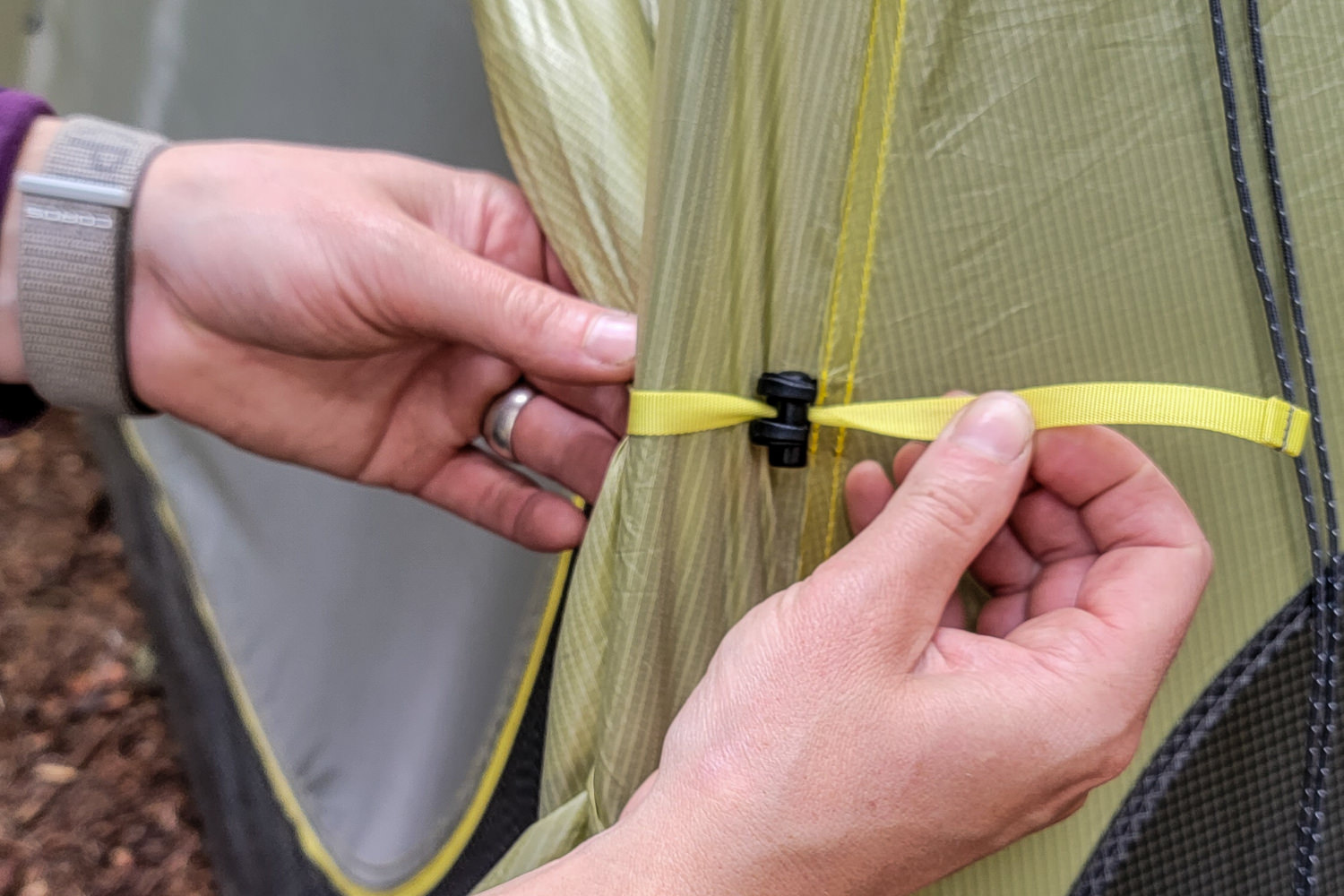
Packed Measurement
Having a tent that packs small is essential for portability. The much less area your tent takes up, the extra room you’ve gotten for different necessities. Plus, a smaller backpack profile is extra snug and maneuverable. The Huge Agnes Tiger Wall, NEMO Hornet OSMO, and MSR FreeLite tents pack down very small. If packed measurement is your high precedence, any of those tents might work.
NEMO Hornet OSMO – 12.5 x 7.5 x 3.5 in.
The Hornet packs down the smallest. At a mere 12.5 inches, the Hornet’s pole segments fold into considerably smaller sections than the 18-inch poles of the Tiger Wall or FreeLite. Most tent poles are too lengthy to be packed contained in the backpack, so they’re saved on the surface whereas mountaineering – however not the Hornet. It packs so small, we match your entire tent and poles simply within our backpacks. Your complete bundle matches nicely horizontally and vertically.
We don’t suggest storing poles inside your bag long run to stop damaging different gear, however having the choice opened up beneficial outdoors storage that’s devoted area for the FreeLite and Tiger Wall. This sort of measurement versatility is exclusive to the Hornet and an enormous benefit for backpackers.
MSR FreeLite – 4.5 x 4.5 x 18 in.
The width of the FreeLite when packed is 4.5 inches, however it’s tied with the Tiger Wall for the size of poles at 18 inches. You could possibly cut back it much more with a unique stuff sack and the poles saved individually.
Huge Agnes Tiger Wall – 5.5 x 5.5 x 18 in.
The Tiger Wall has the largest packed measurement of the three tents, measuring an inch wider than the FreeLite. Think about using a unique compression sack and storing the poles on the surface of your backpacks to scale back the quantity of inner area used.
Winner – NEMO Hornet OSMO
The NEMO Hornet OSMO handily takes the prize for the smallest packed measurement. We’re impressed with how small the Hornet can get, making it essentially the most versatile for carrying in your backpack or storing at dwelling. With poles virtually six inches longer, the FreeLite is available in second, and the Tiger Wall is third as a result of it packs the widest. Nevertheless, we expect all of those tents provide a remarkably small packed measurement and would complement most backpacking kits.
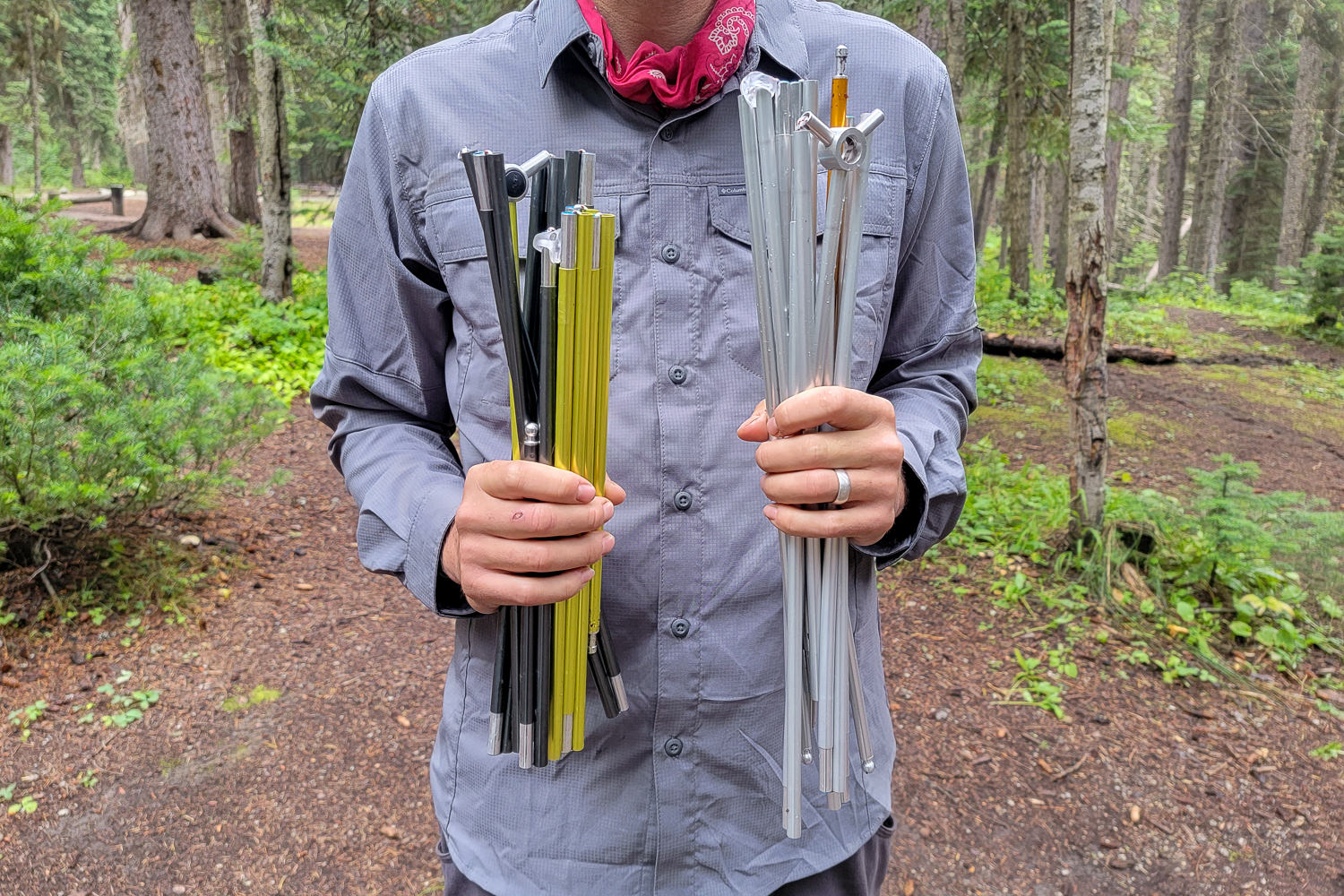
Doorways & Zippers
We favor tents with two doorways. Whether or not mountaineering with a associate or exploring trails solo, tents with two doorways are useful for coping with restricted campsite area, orienting to a selected view, and providing an alternate exit in an emergency. Two doorways also can enhance air flow by permitting air to maneuver by means of the tent. Twin entrances make a tent extra livable and versatile for sharing area with a tentmate and organizing gear.
For the Doorways and Zippers class, we ranked exterior rainfly doorways and inside tent doorways individually to find out the winner.
RAINFLY
MSR FreeLite – We discovered the FreeLite’s rainfly doorways had been simple to open with a single zipper and easy to maneuver by means of. The medium-sized forehead bar helps hold the door flaps off of the inside tent, so lingering rainfly condensation by no means leaves the vestibule. The FreeLite’s rainfly tie-backs are in an intuitive and purposeful location that hold the doorways out of the best way and permit a little bit extra air flow.
NEMO Hornet OSMO – The Hornet’s giant rainfly doorways additionally characteristic a single zipper. We like the location of the Hornet’s door tie-backs over the Tiger Wall, however lower than the FreeLite. The tie-backs are positioned low, which generally causes condensation to drip on us or gear whereas attempting to pin the door again. The Hornet’s doorways might additionally flap into the vestibule and towards the inside of the tent, a problem when the doorways had been moist with condensation or rain. We just like the triangular form and measurement of the rainfly doorways for ease of use.
Huge Agnes Tiger Wall – The Tiger Wall is available in final place due to the situation of the door tie-backs and clasps: they’re very low on the tent. This uncommon design means for those who’re inside attempting to get the rainfly flap out of the best way to exit, you’re more likely to brush towards condensation or a soaked rainfly, dousing each you and your gear. We additionally discovered the door design was too low. We needed to duck fastidiously when getting into the tent to keep away from brushing or bumping our heads on the tent. The Tiger Wall rainfly doorways have two-way zippers, the one tent of the three that gives this configuration. Two-way zippers will help with air flow, however this wasn’t sufficient to maneuver the Tiger Wall out of third place.
Winner – MSR FreeLite
The MSR FreeLite wins for the very best rainfly door. A mixture of well-placed tiebacks and sensible design put its giant doorways on the high. The Hornet is available in second, and the Tiger Wall in third.
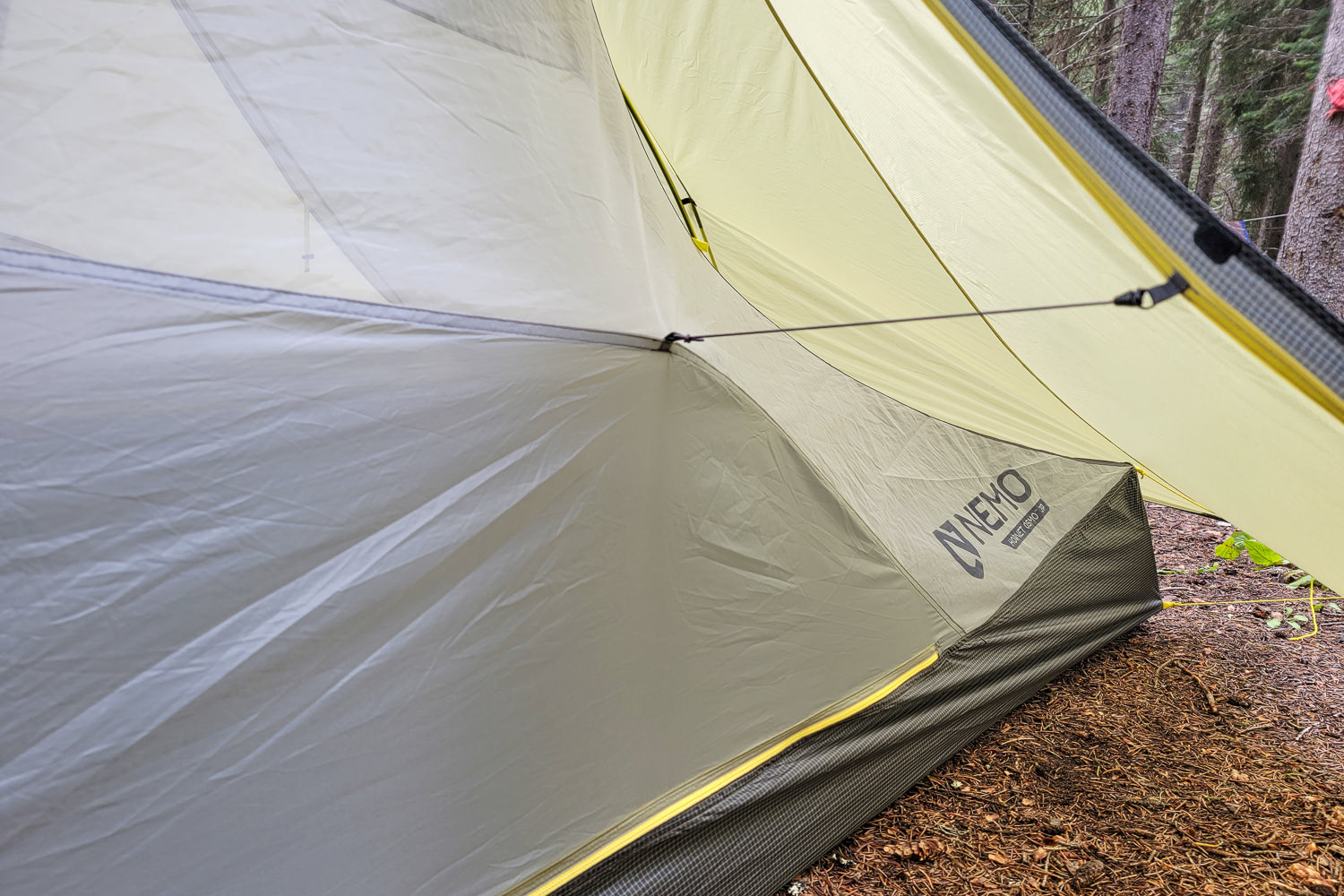
INTERIOR DOORS
Huge Agnes Tiger Wall The Tiger Wall has two zippers on inside “L”-shaped doorways. One zipper runs vertically, the opposite runs alongside the bottom, they usually meet on the nook. This design makes for simple, one-hand door opening and provides the pliability to entry the vestibule by simply opening the zipper on the backside, even whereas mendacity down. The Tiger Wall additionally has the largest inside doorways. The inside door tieback is ready excessive, which retains it fully out of the best way to make getting out and in simple.
MSR FreeLite – The FreeLite’s inside door is triangular and L-shaped, however the is smaller and at a sharper angle than these of the Tiger Wall. Tiebacks are intuitively positioned in the course of the door and maintain again the tent materials. Just like the Tiger Wall, the FreeLite additionally gives two zippers that meet on the nook for simple open-and-close with one hand or accessing gear outdoors.
NEMO Hornet OMSO – We discovered the Hornet’s doorways had been extra cumbersome and fewer purposeful than the opposite two tents. The Hornet’s inside doorways are a half-circle form and solely have one zipper. We discovered the doorways are arduous to open with one hand due to their form and the design of the tent. With out utilizing two arms, cloth bunches up and prevents a easy zip. The tiebacks are lengthy and positioned nicely to maintain the door out of the best way when wanted.
Winner – Huge Agnes Tiger Wall
The Huge Agnes Tiger Wall has the very best inside doorways of those three tents. They’re massive, simple to open with one hand, and the 2 zippers are handy and purposeful. The FreeLite is available in second and the Hornet in third.
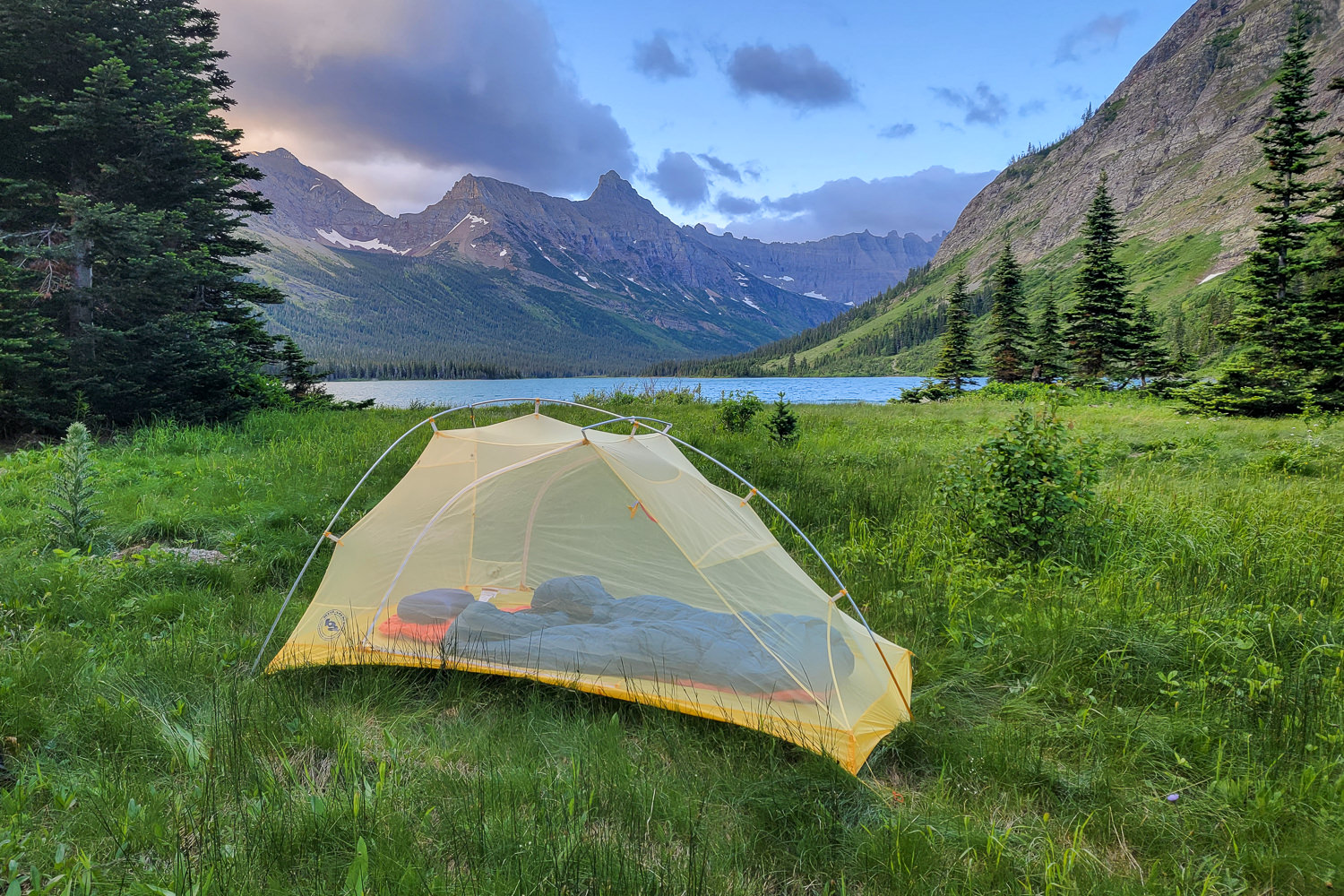
Air flow
On the whole, semi-freestanding tents don’t provide nice air flow in comparison with freestanding fashions. The Huge Agnes Tiger Wall UL 2, NEMO Hornet OSMO 2, and MSR FreeLite 2 don’t provide luxurious options typical of freestanding tents like kickstand roof vents or adjustable rainfly heights that may assist mitigate condensation even higher. The mesh uppers of the inside tent definitely assist with airflow, however air flow is restricted as soon as the tent is totally zipped up.
As a result of lack of air flow, condensation can construct up in a single day in all three of those tents, particularly throughout moist and chilly climate. We’ve by no means discovered condensation to be a serious concern as a result of the double wall design manages this moisture nicely. In contrast to a non-freestanding tent, the air hole between the inside mesh and the rainfly successfully retains condensation away from you and your gear. These tents are made with skinny efficiency materials that maintain a stunning quantity of moisture however dry rapidly within the solar.
Huge Agnes Tiger Wall – The Tiger Wall gives two zippers on the rainfly, so you may open the highest part of the fly for airflow whereas sustaining some privateness. Nevertheless, this isn’t sensible throughout moist climate. Just like the FreeLite, the inside tent additionally gives two zippers, permitting campers to go away one open for a bit extra air flow.
NEMO Hornet OSMO – On the foot of the Hornet, the rainfly is reduce out. This protects weight, however it creates a single-wall part on the tent. Despite the fact that this space is vulnerable to condensation as a result of it creates a big nylon part as an alternative of mesh, this single-wall part of the tent helps with breathability.
MSR FreeLite – Similar because the Hornet, the FreeLite has a single-wall part on the foot of the tent the place there’s no rainfly. This helps incrementally with air flow.
Winner – Huge Agnes Tiger Wall
The Tiger Wall’s double zipper on the rainfly and double zipper on the inside tent provide only a bit extra air flow than the FreeLite and Hornet. It’s price noting that it is a small quantity of additional airflow. All three tents use skinny, breathable materials, however are finally missing in air flow options.
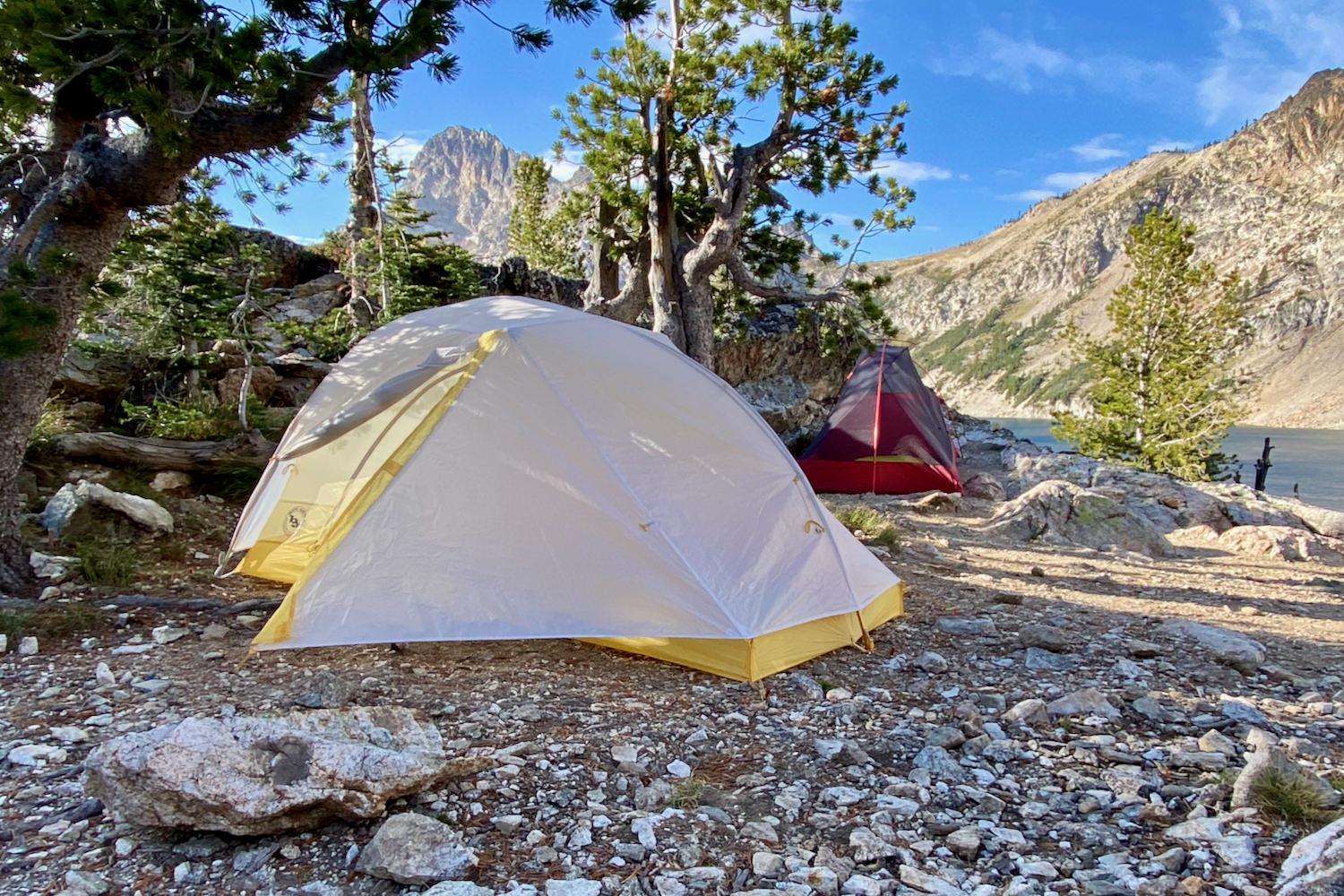
Eco-Pleasant
The out of doors business might be extremely wasteful. Manufacturing tents typically requires uncooked supplies like petroleum to provide artificial materials and aluminum for tent poles. The method of producing textiles is resource-intensive, creating monumental quantities of water waste. As well as, Cloth remedies use chemical coatings and sealants that may be dangerous to the setting. Transporting merchandise all around the world provides to carbon emissions.
It’s a paradox: the very objects we use to benefit from the open air can hurt the setting throughout their manufacturing. Firms that target sustainable materials sourcing, recycled materials, accountable and humane labor practices, home manufacturing, and utilizing much less power and water could make a constructive impression on the native and world setting.
Huge Agnes Tiger Wall – In 2021, Huge Agnes modified the best way it dyes all of its tents with a technique known as resolution dying. It dyes supplies earlier than they’re processed, as an alternative of afterwards. This dying method reduces power consumption by 80% and water use by 50%. Which means the Tiger Wall is produced with as few carbon emissions and chemical compounds as potential. And, its tent poles are totally recyclable.
Huge Agnes amenities run on 100% electrical power. The corporate doesn’t use any flame retardants in its merchandise, makes use of licensed Accountable Down Commonplace for sourcing down, and prioritizes 50-100% recycled insulation to be used in its jackets and sleeping luggage. Huge Agnes has additionally lowered its variety of poly luggage for objects like furnishings and stakes. Try its lengthy listing of eco-friendly initiatives.
NEMO Hornet OSMO – The Hornet makes use of OSMO cloth, a mix of polyester and nylon that’s free from endlessly chemical compounds like hearth retardants, PFAs, and PFCs. The tent is Blue Signal accepted and assured freed from poisonous supplies.
NEMO pledges to chop its emissions in half by 2030. Their workplace runs on 100% renewable power. NEMO gives a lifetime assure and repairs, so when your Hornet wants a contemporary zipper or the ground requires greater than only a patch, you may restore your tent as an alternative of including it to the landfill. NEMO has launched various 100% recycled and recyclable merchandise. The corporate launched its Infinite Promise Program, which is a dedication by the corporate to make gear extra recyclable and cut back waste with a closed-loop system: recycling, repairing, and reselling supplies and merchandise.
MSR FreeLite – Each the nylon cloth and aluminum of the FreeLite are constructed from recyclable supplies.
MSR’s manufacturing and workplace amenities are powered by a minimal of 25% renewable power. All merchandise are freed from BPA, PFAs, and harsh chemical compounds. MSR sources all packaging supplies native to its US-based manufacturing amenities. Home manufacturing makes their environmental footprint a lot decrease versus producing internationally. It additionally has a sturdy restore program for its tents, backpacks, and a few garments, and boasts an 85% or larger fee of restore for all merchandise returned to them for fixing. Learn extra about their dedication to sustainability.
Winner – Huge Agnes Tiger Wall
The Tiger Wall is the winner for eco-friendliness due to its Resolution-Dyed Cloth. The dramatic discount in sources used to provide such a high quality tent, mixed with Huge Agnes’ dedication to lowering emissions throughout all amenities and merchandise, makes it distinctive.
However none of those firms are slacking relating to excited about their environmental footprint. Huge Agnes, NEMO, and MSR have all made important strides during the last decade to scale back power consumption, give attention to recyclable merchandise, and transition to eco-friendly dyes, chemical compounds, and manufacturing practices. Every firm has its personal academic initiatives and conservation partnerships. Huge Agnes, NEMO, and MSR are on the forefront of the dialog round methods to reuse or repurpose out of doors merchandise as an alternative of sending them to the landfill.
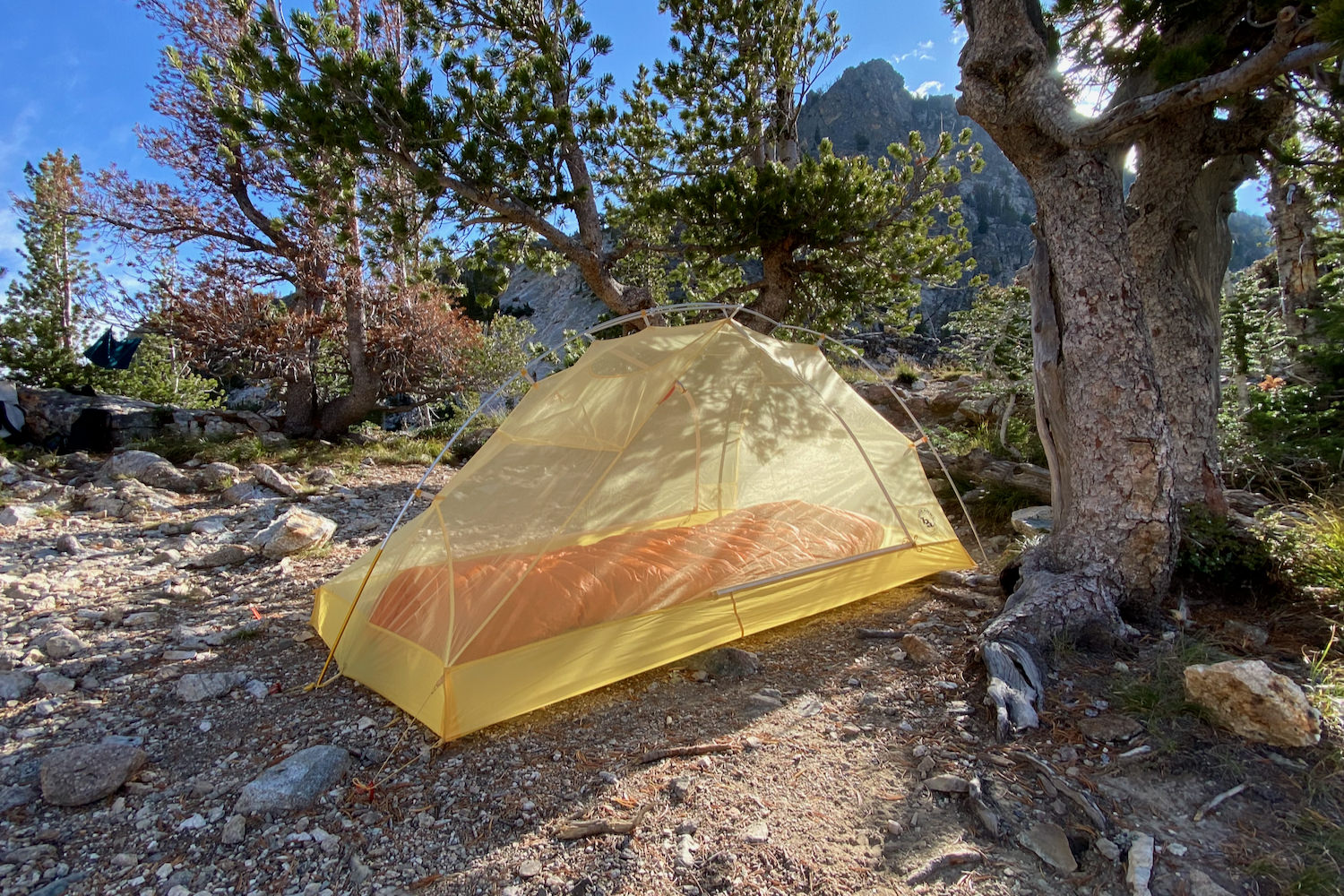
Winner
Our winner within the comparability of the Huge Agnes Tiger Wall, MSR FreeLite, and NEMO Hornet OSMO tents is the Huge Agnes Tiger Wall.
- Huge Agnes Tiger Wall – 8 factors
- MSR FreeLite – 7 factors
- NEMO Hornet OSMO – 5 factors
Total Winner – Huge Agnes Tiger Wall
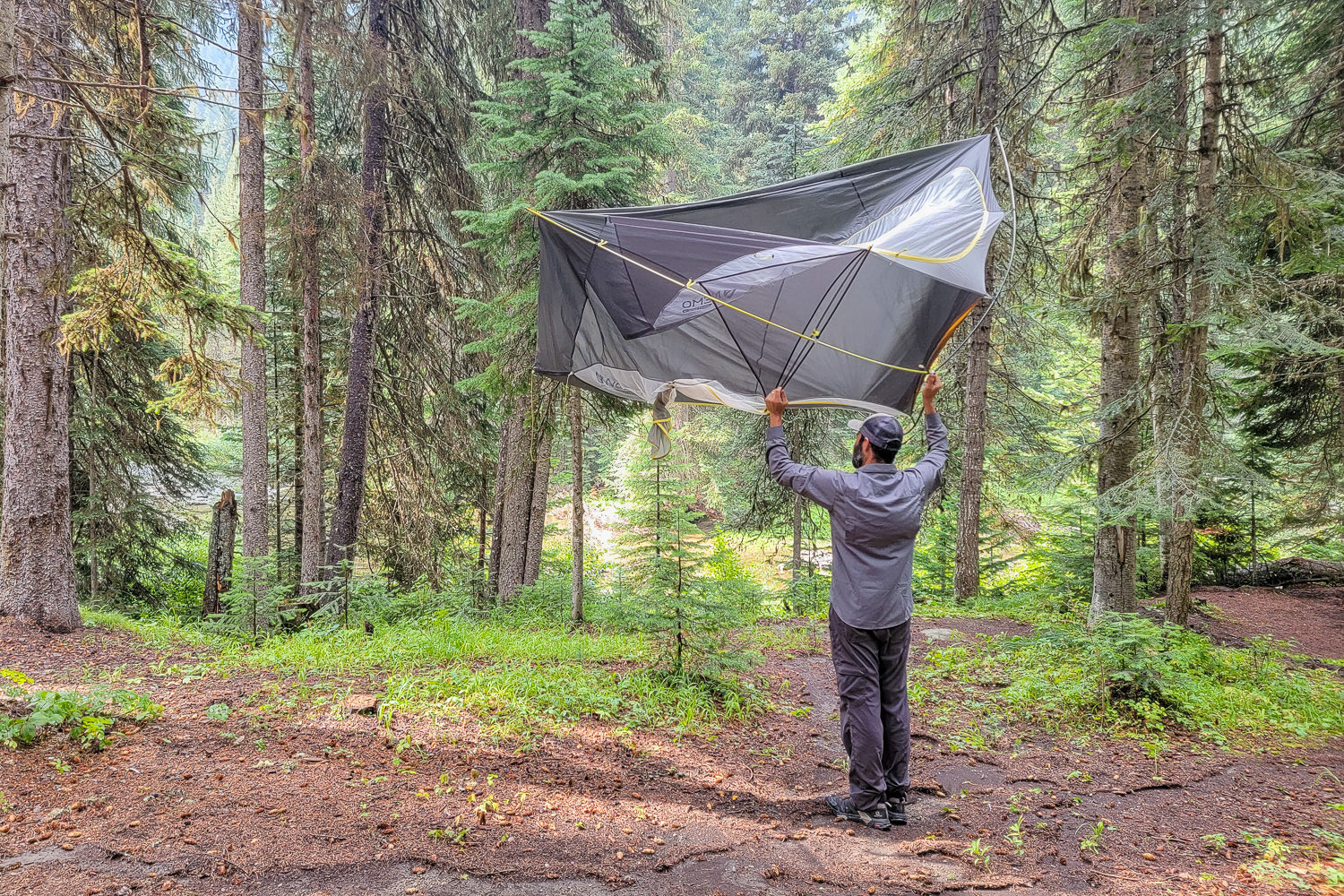
Backside Line
The Huge Agnes Tiger Wall, NEMO Hornet OSMO, and MSR FreeLite tents are among the finest ultralight tents out there. All three tents are tied for excellent climate safety, versatility, and ease of use. We expect every tent gives a reliably dry and protected shelter in moist climate and excessive winds. They’re exceptionally mild, easy to arrange, and versatile sufficient for many tenting conditions.
Huge Agnes Tiger Wall – The Tiger Wall is our favourite tent general due to its roomier dimensions and beneficiant pocket construction. Inside area issues in a backpacking shelter, and the Tiger Wall gives essentially the most headroom. It’s the one possible choice on this listing for 2 campers. The Tiger Wall additionally has the most important vestibule area and largest inside door, and we like that the rainfly covers all sides of the tent. Its distinctive loft pocket makes it simple to stash cumbersome gear like jackets. Huge Agnes’ dedication to eco-friendly initiatives is a bonus.
The Tiger Wall’s cloth doesn’t really feel as sturdy because the Hornet or the FreeLite as a result of it sags essentially the most in chilly and moist climate. Its rainfly door design might be improved by placing tiebacks in a greater location. It additionally packs the largest of the three tents. Nevertheless, the Tiger Wall gives virtually every part we wish in a semi-freestanding and ultralight tent, making it the winner.
MSR FreeLite – The FreeLite works finest as an ultralight solo shelter. It weighs the least of the three tents however nonetheless has handy pockets. It feels essentially the most sturdy due to the mixture of metallic grommets and 15 nylon materials. We just like the rainfly on the FreeLite due to its intuitively positioned tie-backs that hold the doorways out of the best way. It gives essentially the most ground space to unfold out gear and get snug on its extensive, rectangular ground and stayed in second place amongst these tents for packed measurement, inside area, and vestibule measurement.
The FreeLite has much less headroom than we want. Its rain gutters are a pleasant characteristic, however they don’t appear to assist shed moisture higher than the opposite tents. We discovered the triangular pockets are purposeful, however not as spacious or dynamic because the Tiger Wall.
NEMO Hornet OSMO – The Hornet is a wonderful choice for single hikers beneath 6 toes tall who need an ultra-packable, no-frills tent. We like that the quick pole sections, at ⅔ of the size of the Tiger Wall or FreeLite, make the tent so small that we might stash your entire shelter and poles in our backpacks. The Hornet is snug and units up rapidly. We’re impressed that the fabric doesn’t sag as a lot because the FreeLite or the Tiger Wall in chilly and moist climate. The Hornet can be essentially the most reasonably priced of those three tents.
However the Hornet is available in third place as a consequence of an absence of pockets and inside area. Two ceiling pockets aren’t sufficient to remain organized and declutter the tent, particularly in comparison with the Tiger Wall or FreeLite. The Hornet additionally has the smallest vestibule area, ground area, and inside of the three tents. The slim headroom and a good pole construction are small for 2 folks. Additionally, the inside door form and single zipper aren’t as simple to make use of as the opposite tents.
All three semi-freestanding tents are distinctive, feature-rich shelters. They’re extra reasonably priced than a trekking pole shelter however lighter than a freestanding tent. The Huge Agnes Tiger Wall UL2, MSR FreeLite, and NEMO Hornet OSMO 2 are on our Finest Backpacking Tents Information for the proper causes.
When the competitors is that this stiff, think about your private priorities. Whether or not you’re after the tiniest packed measurement, the largest doorways, or essentially the most headroom, one in every of these tents is tailored on your subsequent backcountry journey. Irrespective of the place you’re headed subsequent, these shelters will hold you protected, dry, and comfy – with out the additional weight.
